 30/06/2010 01:33 30/06/2010 01:33 |
|
| | | OFFLINE | | Post: 20.487
Post: 3.125 | Registrato il: 28/08/2005
Registrato il: 20/01/2009 | Administratore | Utente Master | |
|




 MASS ON THE SOLEMNITY
MASS ON THE SOLEMNITY
OF SAINTS PETER AND PAUL
The Pope confers the pallium
on 38 new metropolitan archbishops
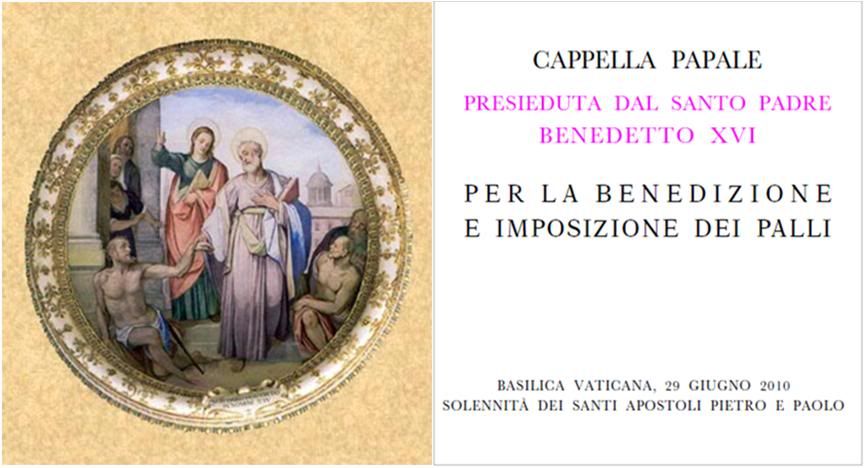
 Cover illustration: 'What I do have I give you in the name of Jesus Christ' (Acts 3,6) - Peter to a lame man he healed outside the Temple of Jerusalem. Fresco by Federico Zuccari, 1584, Cappella Paolina, Vatican Apostolic Palace. Frieze below: Details from 'Crucifixion of Peter' and 'Conversion of Paul', Michelangelo, 1550, Cappella Paolina.
Cover illustration: 'What I do have I give you in the name of Jesus Christ' (Acts 3,6) - Peter to a lame man he healed outside the Temple of Jerusalem. Fresco by Federico Zuccari, 1584, Cappella Paolina, Vatican Apostolic Palace. Frieze below: Details from 'Crucifixion of Peter' and 'Conversion of Paul', Michelangelo, 1550, Cappella Paolina.

At 9:30 Tuesday morning, Solemnity of the Holy Apostles Peter and Paul, the Holy Father Benedict XVI presided at the concelebration of the Eucharist with 38 metropolitan archbishops named in the past 12 months.
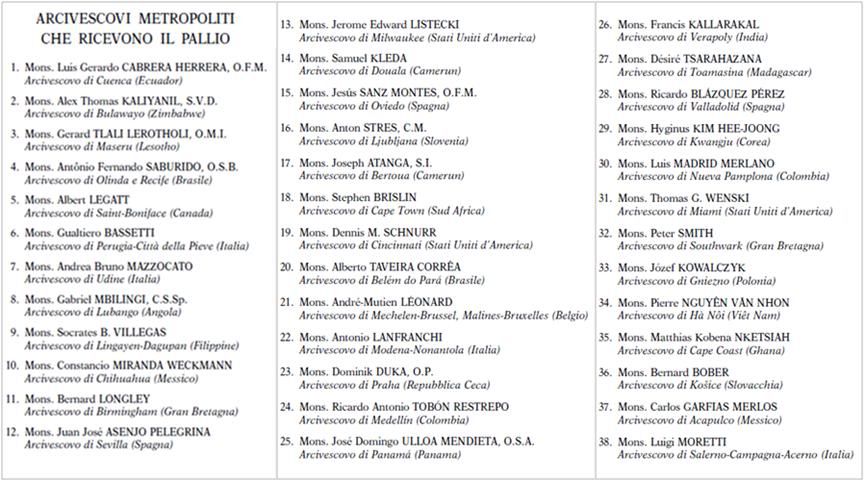
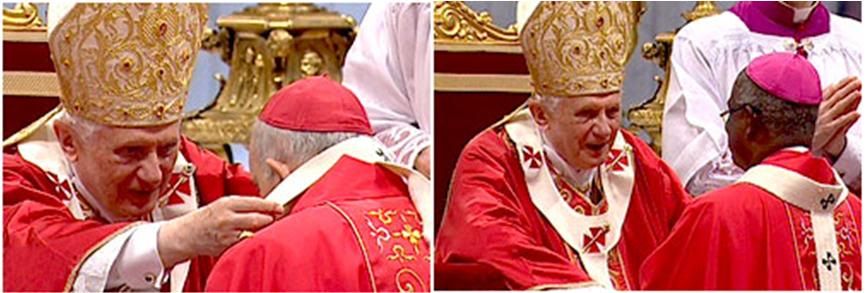
During the Mass, the Holy Father conferred on each archbishop a pallium as a sign of their episcopal function. The palliums were kept overnight on the tomb of St. Peter below the main altar of the basilica.
As has become traditional on the Feast of Saints Peter and Paul, a delegation from the Ecumenical Patriarchate of Constantinople was present, this year, composed of His Eminence Gennadios Limouris, Metropolitan of Sassima; H. E. Bartholamaios (Ioannis Kessidis), Bishop of Arianzos, and assistant to the Orthodox metropolitan of Germany; and the Rev. Deacon Theodoros Maimaris, from Fanar, the Patriarchal seat.
Here is Vatican Radio's translation of the Holy Father's homily, delivered before the blessing and imposition of the palliums.
Dear brothers and sisters!
In their great wealth, the biblical texts of this Eucharistic Liturgy of the Solemnity of Saints Peter and Paul highlight a theme that could be summarized thus: God is close to his faithful servants and frees them from all evil, as he frees the Church from negative powers. It is the theme of the freedom of the Church, which has a historical aspect and another more deeply spiritual one.
This theme runs through today's Liturgy of the Word. The first and second readings speak, respectively, of St Peter and St Paul, emphasizing precisely the liberating action of God in them.
Especially the text from the Acts of the Apostles describes in abundant detail the intervention of the Angel of the Lord, who releases Peter from his chains and leads him outside the prison in Jerusalem, where he had been locked up, under close supervision, by King Herod (cf. at 12.1 to 11).
Paul, however, writing to Timothy when he feels close to the end of his earthly life, takes stock which shows that the Lord was always near him and freed him from many dangers and frees him still by introducing him into His eternal Kingdom ( see 2 Tim 4, 6-8.17-18).
The theme is reinforced by the Responsorial Psalm (Ps 33), and also finds a particular development in the Gospel of Peter's confession, where Christ promises that the powers of hell shall not prevail against his Church (cf. Mt 16:18).
Observing closely we note a certain progression regarding this issue. In the first reading a specific episode is narrated that shows the Lord's intervention to free Peter from prison. In the second Paul, on the basis of his extraordinary apostolic experience, is convinced that the Lord, who already freed him "from the mouth of the lion "delivers him" from all evil, by opening the doors of Heaven to him.
In the Gospel, we no longer speak of the individual Apostles, but the Church as a whole and its safekeeping from the forces of evil, in the widest and most profound sense.
Thus we see that the promise of Jesus - "the powers of hell shall not prevail" against the Church – includes the historical experience of persecution suffered by Peter and Paul and other witnesses of the Gospel, but it goes further, wanting to protect especially against threats of a spiritual order, as Paul himself writes in his Letter to the Ephesians: "For our struggle is not with flesh and blood but with the principalities, with the powers, with the world rulers of this present darkness, with the evil spirits in the heavens"(Eph 6:12).
Indeed, if we think of the two millennia of Church history, we can see that - as the Lord Jesus had announced (cf. Mt 10.16-33) – Christians have never been lacking in trials, which in some periods and places have assumed the character of real persecution.
These, however, despite the suffering they cause, are not the greatest danger for the Church. In fact it suffers greatest damage from what pollutes the Christian faith and life of its members and its communities, eroding the integrity of the Mystical Body, weakening its ability to prophesy and witness, tarnishing the beauty of its face.
This reality is already attested in the Pauline Epistle. The First Epistle to the Corinthians, for example, responds to some problems of divisions, inconsistencies, of infidelity to the Gospel which seriously threaten the Church.
But the Second Letter to Timothy – of which we heard an excerpt - speaks about the dangers of the "last days", identifying them with negative attitudes that belong to the world and can infect the Christian community: selfishness, vanity, pride, love of money, etc. (cf. 3.1 to 5).
The Apostle’s conclusion is reassuring: men who do wrong - he writes - "will not make further progress, for their foolishness will be plain to all"(3.9). There is therefore a guarantee of freedom promised by God to the Church: it is freedom from the material bonds that seek to prevent or coerce mission, both through spiritual and moral evils, which may affect its authenticity and credibility.
The theme of the freedom of the Church, guaranteed by Christ to Peter, also has a specific relevance to the rite of the imposition of the pallium, which we renew today for thirty-eight metropolitan archbishops, to whom I address my most cordial greeting, extending with it affection to all who have wanted to accompany them on this pilgrimage.
Communion with Peter and his successors, in fact, is the guarantee of freedom for the Church's Pastors and the Communities entrusted to them. It is highlighted on both levels in the aforementioned reflections.
Historically, union with the Apostolic See, ensures the particular Churches and Episcopal Conferences freedom with respect to local, national or supranational powers, that can sometimes hinder the mission of the ecclesial Church.
Furthermore, and most essentially, the Petrine ministry is a guarantee of freedom in the sense of full adherence to truth and authentic tradition, so that the People of God may be preserved from mistakes concerning faith and morals.
Hence the fact that each year the new Metropolitans come to Rome to receive the pallium from the hands of the Pope, must be understood in its proper meaning, as a gesture of communion, and the issue of freedom of the Church gives us a particularly important key for interpretation.
This is evident in the case of churches marked by persecution, or subject to political interference or other hardships. But this is no less relevant in the case of communities that suffer the influence of misleading doctrines or ideological tendencies and practices contrary to the Gospel.
Thus the pallium becomes, in this sense, a pledge of freedom, similar to the "yoke" of Jesus, that He invites us to take up, each on their shoulders (Mt 11:29-30). While it is demanding, the commandment of Christ is "sweet and light" and instead of weighing down on the bearer, it lifts him up. Thus the bond with the Apostolic See – while challenging – sustains the Pastor and the portion of the Church entrusted to his care, making them freer and stronger.
I would like to draw a final point from the Word of God, in particular from Christ's promise that the powers of hell shall not prevail against his Church.
These words may also have a significant ecumenical value, since, as I mentioned earlier, one of the typical effects of the Devil is division within the Church community. The divisions are in fact symptoms of the power of sin, which continues to act in members of the Church even after redemption.
But the word of Christ is clear: "Non praevalebunt – the gates of Hell will not prevail" (Matt. 16:18). The unity of the Church is rooted in its union with Christ, and the cause of full Christian unity - always to be sought and renewed from generation to generation - is well supported by his prayer and his promise.
In the fight against the spirit of evil, God has given us in Jesus the 'Advocate', defender, and after his Easter, "another Paraclete" (Jn 14:16), the Holy Spirit, which remains with us always and leads the Church into the fullness of truth (cf. Jn 14:16; 16:13), which is also the fullness of charity and unity.
With these feelings of confident hope, I am pleased to greet the delegation of the Patriarchate of Constantinople, which, in the beautiful custom of reciprocal visits, participates in the celebrations of the patron saints of Rome.
Together we thank God for progress in ecumenical relations between Catholics and Orthodox, and we renew our commitment to generously reciprocate to God's grace, which leads us to full communion.
Dear friends, I cordially greet all of you: Cardinals, Brother Bishops, Ambassadors and civil authorities, in particular the Mayor of Rome, priests, religious and lay faithful. Thank you for your presence.
May the Saints Peter and Paul help you to grow in love for the holy Church, the Mystical Body of Christ, the Lord and messenger of unity and peace for all men. May they also help you to offer the hardships and sufferings endured for fidelity to the Gospel with joy for her holiness and her mission.
May the Virgin Mary, Queen of Apostles and Mother of the Church, always watch over you and especially over the Ministry of metropolitan archbishops. With her heavenly help may you always live and act in that freedom that Christ has won for us. Amen.
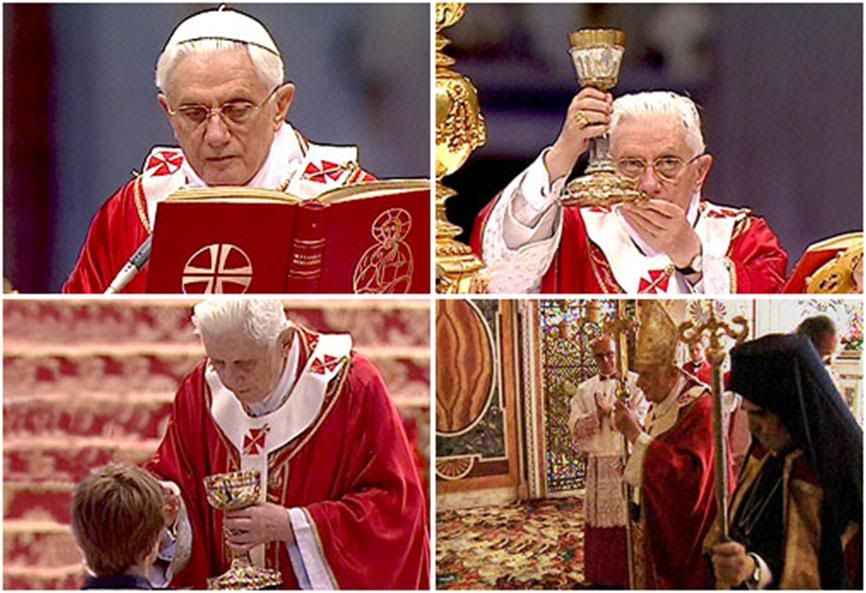 NB: Before they are conferred with the pallium, each new Archbishop pronounces this oath:
NB: Before they are conferred with the pallium, each new Archbishop pronounces this oath:
I will always be faithful and obedient to the Apostle Peter; to the Holy, Apostolic Church of Rome; and to you, Supreme Pontiff, and your legitimate successors. May Almighty God so help me!
Judging by the behavior of many bishops, they either do not remember that they ever made this oath or have chosen to openly defy it. Among the most offensive in this respect are some Italian bishops!
Meanwhile, the Holy Father's message to the ministers of the Church that they may live up to the holiness demanded of them by their vocation has been not just consistent but increasingly forceful.
His repetition today of his statement on his way to Fatima was even more explcit. Speaking of external perscutions, he said:
These, however, despite the suffering they cause, are not the greatest danger for the Church. In fact it suffers greatest damage from what pollutes the Christian faith and life of its members and its communities, eroding the integrity of the Mystical Body, weakening its ability to prophesy and witness, tarnishing the beauty of its face.
But there is also what he said today about the Petrine ministry:
Communion with Peter and his successors, in fact, is the guarantee of freedom for the Church's Pastors and the Communities entrusted to them.... Furthermore, and most essentially, the Petrine ministry is a guarantee of freedom in the sense of full adherence to truth and authentic tradition, so that the People of God may be preserved from mistakes concerning faith and morals.
The Pope is, first and foremost, the guardian and defender of the faith, and so, he cannot allow any dilution, much less reversal, of the deposit of faith, of Tradition handed down over two millennia through apostolic succession.
NB: Salvatore Izzo of AGI says that the Vatican will be formally announcing tomorrow, June 30, the appointments of Cardinal Marc Ouellet of Montreal and Mons. Kurt Koch of Basel to succeed the retiring Cardinals Giovanni Battista Re and Walter Kasper, respectively, as Prefect of the Congregation for Bishops and as President of the Pontifical Council for Promoting Christian Unity. Perhaps the Motu Proprio creating the new Pontifical Council for new evangelization will also be released.
Not to forget...
59 YEARS AGO
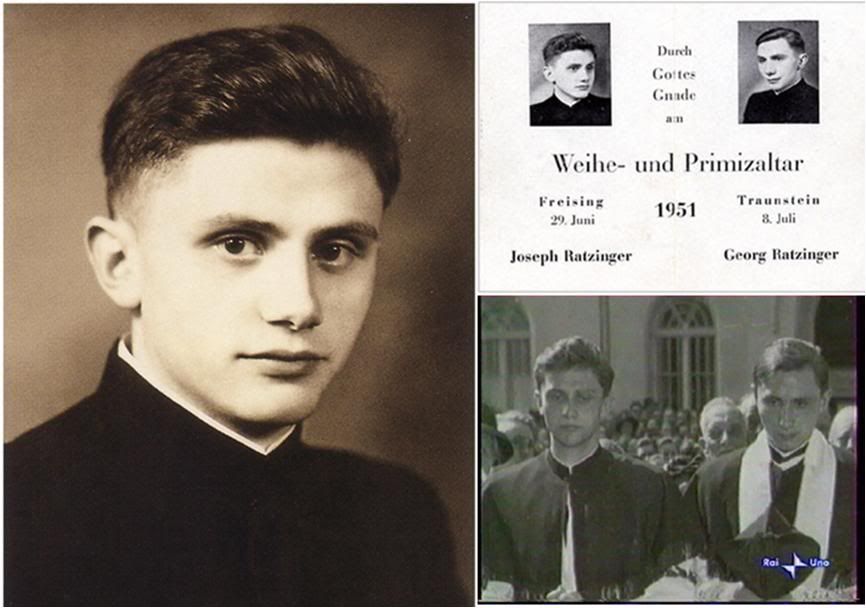
... Georg and Joseph Ratzinger were ordained as priests in the Cathedral of Freising, and would celebrate their first Mass in Traunstein one week later.
[Modificato da TERESA BENEDETTA 29/06/2012 15:40] |
| |
|
| |
 30/06/2010 13:16 30/06/2010 13:16 |
|
| | | OFFLINE | | Post: 20.488
Post: 3.126 | Registrato il: 28/08/2005
Registrato il: 20/01/2009 | Administratore | Utente Master | |
|
[Modificato da TERESA BENEDETTA 30/06/2010 13:19] |
| |
 30/06/2010 13:19 30/06/2010 13:19 |
|
| | | OFFLINE | | Post: 20.489
Post: 3.127 | Registrato il: 28/08/2005
Registrato il: 20/01/2009 | Administratore | Utente Master | |
|
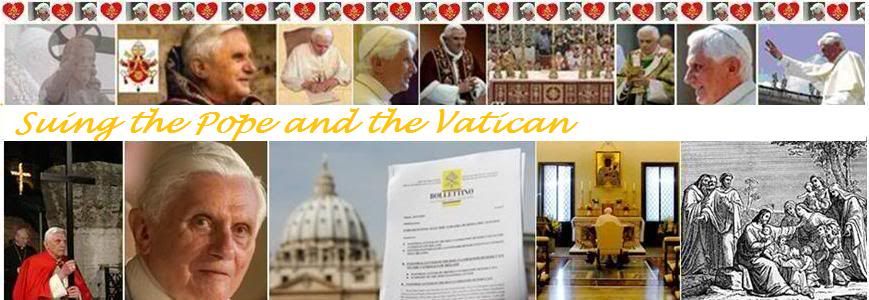 Two important clarifications
Two important clarifications
on the judicial news from the US
The first has to do with the case itself, at least as Il Foglio summarizes it in an editorial yesterday: It concerns a religious of the Servite order, Andrew Ronan, who 50 years ago was assigned by his order from Ireland to Chicago and then to Portland, Oregon, where some ten years after he came to the USA - i.e., four decades ago , in the 1960s - he abused a minor, was denounced by priests who knew about the abuse, confessed and was laicized in 1966! Apparently, he had also committed abuses in Ireland and in Chicago. Ronan died in 1982.
a) Obviously the timeline makes it clear Joseph Ratzinger could have had nothing to do with this case. Fifty years ago, he was a university professor, who had been a priest only for nine years.
b) Ronan belonged to a religious order, whose administrative decisions - e.g., assignment of priests - are completely autonomous and have nothing to do with the Vatican at all, nor, as I understand it, even with the diocese to which they are assigned other than its consent to have the priest work on its territory and carry out pastoral duties.
c) Tne file on Ronan from the Archdiocese of Oregon
www.archdiocesedocuments.org/uploads/Fr_Ronan.pdf
shows there was even no correspondence with the Vatican about Ronan until 1966 in connection with his laicization ('defrocking').
And yet, none of this was mentioned by the MSM stories about the SCOTUS (Supreme Court of the United States) decision not to take up the case during its 2009-2010 session which ended the other day. They are on summer vacation and will reconvene in October for the 2010-2011 session. It does not preclude they may take it up in a future session.
Those are objective facts about the specific case that SCOTUS has not taken up. Here is what canon law expert Phil lawler writes about the SCOTUS 'decision' itself:
Can the Pope be compelled to testify?
What the Supreme Court did — and did not — say
By Phil Lawler

June 29, 2010 3:23 PM
Despite the impression created by dozens of headline stories, the US Supreme Court did not issue a decision against the Vatican yesterday, nor have sex-abuse victims won the right to take testimony from the Pope.
In fact, the Supreme Court did not issue any decision at all. The justices decided not to decide.
Every year thousands of legal decisions are appealed to the Supreme Court. The nation’s top court can handle only a fraction of those cases. The justices choose the issues that seem most pressing from a constitutional point of view, and leave the lower courts to sort out the remaining cases.
On Monday, the court announced that it would not hear the Vatican’s appeal of an Oregon court’s ruling that allowed the Holy See to be listed as a defendant in a sex-abuse lawsuit. The suit, originally filed in 2002, now goes back to the Oregon court for arguments.
By declining to hear the case, the Supreme Court did deal a minor legal setback to the Vatican, which had sought to have the case summarily dismissed.
But the Oregon court’s ruling — which the Supreme Court let stand —only gives plaintiff the opportunity to argue that the Pope and the Vatican can be included as defendants. That argument is far from resolved.
In their effort to include the Pope as a defendant, the plaintiff faces an uphill struggle. The Foreign Sovereign Immunity Act protects the Holy See from liability unless the plaintiff can demonstrate that the priest who abused him was acting as an employee of the Vatican.
By any of the normal legal standards — who signed his paycheck, who was his direct supervisor, who gave his assignments — the priest was working for the diocese, not the Vatican. [In this specific case, he was not even working 'for' the diocese although he worked 'in' the diocese - Ronan was working as a Servite, member of a religious order.]
Any effort to draw a connection between diocesan policies and Vatican directives would run into a further obstacle: the historical (and very prudent) reluctance of the American courts to become involved in the internal affairs of a religious body.
Even if an American court did give plaintiffs the right to take testimony from the Pope, the Pope would not be bound by that ruling. The Pope is not subject to American law-- nor to any other system of civil law. He is sovereign; in Vatican City he is the law.
Bottom line: If an American plaintiff takes testimony from the Pope, it will be because the Pope chose to give testimony — not because a court compelled it.
I wish Lawler had bothered to look into the specific Oregon case itself, because then the absurdity of bringing in the Vatican, much less Benedict XVI, into the case is just too blatant to be ignored! No wonder MSM is glossing over the facts of the case itself.
It is yet another egregiously unscrupulous action by Vatican bounty hunter and shyster lawyer Jeffrey Anderson who is behind this whole filing, as he is in assorted other pending cases, and does not care how absurd his claims are as long as they get him publicity!
What I do not understand, however, is why the Oregon appeals court even bought Anderson's arguments to bring in the Vatican into this case! Obviously, a neutral investigative report on this case is much needed. Where are Jason Berry et al in all this?
[Modificato da TERESA BENEDETTA 30/06/2010 15:08] |
| |
 30/06/2010 14:02 30/06/2010 14:02 |
|
| | | OFFLINE | | Post: 20.490
Post: 3.128 | Registrato il: 28/08/2005
Registrato il: 20/01/2009 | Administratore | Utente Master | |
|
 Wednesday, June 30, 13th Week in Ordinary Time
Wednesday, June 30, 13th Week in Ordinary Time
 THE PROTOMARTYRS OF ROME
THE PROTOMARTYRS OF ROME
"It is the annual feast of the sainted protomartyrs of the Holy Roman Church, who, blamed for the burning of the City, were ordered by the emperor Nero to be most savagely slain by means of different torments: some, covered with skins, were exposed to wild dogs and torn to pieces, others were crucified, and others delivered up to burning so that as daylight failed they served to illumine the night. All these were disciples of the Apostles and the first of the martyrs which the Roman Church entrusted to the Lord".
Years ago, Father Z posted an excerpt from a sermon by St. Augustine that makes vivid contemplation on all the martyrs of our faith:
When some festival of the martyrs falls due, perhaps, and some holy place is named at which all are to assemble to celebrate the solemn rites, remember how the throngs incite one another, how people encourage each other, saying, “Come on, let’s go!” Others ask, “Where are we going?” And they are told, “To that place, to the holy site.”
People talk to each other and catch fire with enthusiasm, and all the separate flames unite into a single flame. This one flame that springs up from the conversation of many people who enkindle one another seizes them all and sweeps them along to the holy place. Their devout resolve sanctifies them.
If, then, holy love energizes people and tugs them to a material place, what kind of love must it be that tugs persons united in heart toward heaven, as they say to each other, We are going to the Lord’s house?
Let’s run, let’s run fast, they say, for we are going to the Lord’s house! Let’s run and not weary, because we shall reach a place where fatigue will never touch us.
Let’s run to the Lord’s house, and let our soul be gladdened by those who tell us these things; for those who cheer us on have seen out homeland before we have, and they shout from afar to us latecomers, “We are going to the Lord’s house! Walk! Run!”
The apostles have seen it, and they exhort us, “Run, walk, follow: we are going to the Lord’s house!”
And what do we reply, every one of us? “I rejoice over those who told me, We are going to the Lord’s house. I rejoiced over the prophets and I rejoiced over the apostles, for all of them have told us, We are going to the Lord’s house.” (En. ps. 121.2)
Readings for today's Mass:
www.usccb.org/nab/readings/063010.shtml
No OR today (Yesterday was a religious holiday).
THE POPE'S DAY
General Audience - Still in connection with the recently-concluded Year for Priests, the Holy Father
dedicated his catechesis today to St. Giuseppe Cafasso, one of the great priest/'social saints' produced by
19th-century Turin, and whose feast the Church observed last June 17.
The Holy Father also met with
- Mons. Andre Leonard, Primate of Belgium and Archbishop of Mechelen-Brussels.
The big news from the Vatican today is on the Curial appointments made by the Pope, as had been long expected. See following post.
[Modificato da TERESA BENEDETTA 30/06/2010 16:14] |
| |
 30/06/2010 14:14 30/06/2010 14:14 |
|
| | | OFFLINE | | Post: 20.491
Post: 3.129 | Registrato il: 28/08/2005
Registrato il: 20/01/2009 | Administratore | Utente Master | |
|
 The papal appointments today
The papal appointments today

30 Jun 10 (RV)- Pope Benedict XVI accepted today the resignation of Cardinal Giovanni Battista Re from the post of Prefect of the Congregation for Bishops, and President of the Pontifical Commission for Latin America on having reached the age of retirement.
Cardinal Re, who turned 76 in January, held both posts since 2000.
The Holy Father named Canadian Cardinal Marc Ouellet, P.S.S., Archbishop of Québec and Primate of Canada, to lead the Congregation and Commission.
Born on 8 June 1944 in Lamotte, near Amos, Canada, he was ordained a priest for the Diocese of Amos on 25 May 1968. He holds licentiates in theology and philosophy, and a doctorate in dogmatic theology.
On 15 November 2002, Cardinal Ouellet was appointed Metropolitan Archbishop of Quebec. He is a member of the Pontifical Academy of Theology and was Relator General of the XII Ordinary General Assembly of the Synod of Bishops, “The Word of God in the Life and Mission of the Church” (5-26 October 2008).
He was created and proclaimed Cardinal by John Paul II in the Consistory of 21 October 2003, of the Title of S. Maria in Traspontina (Holy Mary in Transpontina).
Also on Monday, Pope Benedict XVI named Mons. Rino Fisichella to head the Pontifical Council for New Evangelisation.
Archbishop Fisichella was until today, President of the Pontifical Academy for Life, as well as Rector of the Pontifical Lateran University. He will be replaced at the Academy for Life by Spanish Mons. Ignacio Carrasco de Paula, who was chancellor of the Academy.
Fr.Enrico dal Covolo, S.D.B., was named to take over as Rector of the Lateran University.
Also named today was Mons. Celestino Migliore, who has been the Vatican's permanent observer at the United Nations in New York, to be Apostolic Nuncio to Poland.
Below is John Allen's take on the Curial changes, though I might note that it is not so much that the theologians have triumphed over the diplomats, because it is not as if there had been an active battle between those two 'factions' as such. It simply reflects Benedict XVI's own preferences for the men with whom he must work with closely. All Curial appointments are Benedict's personal initiatives, not the result of any Vatican infighting.
Triumph of theologians
over diplomats in Vatican

Jun. 30, 2010
ROME - In what’s already a turbulent time, Pope Benedict XVI has triggered another Vatican earthquake, changing the guard in three senior leadership positions. [Two, not three. And what earthquake, when these changes were long forthcoming! - The changing of the guard in the case of the Congregation for Bishops and the Pontifical Council for Christian Unity is, fortuitously, because both previous dicastery heads are past canonical retirement age. And the third position is a new one, so there is no question of 'changing the guard']]
Among those exiting the scene is the Catholic church’s most prominent ecumenical leader over the past decade, while the new arrivals complete the ascent of personal friends and theological protégés of the pontiff to the Vatican’s top positions.
The Vatican announced today two key personnel moves:
• Cardinal Marc Ouellet of Quebec replaces Cardinal Giovanni Battista Re as Prefect of the Congregation for Bishops, responsible for recommending new bishops to the pope all over the world;
• Archbishop Rino Fisichella becomes the first President of the new Pontifical Commission for Promotion of the New Evangelization, a new Vatican department devoted to reawakening the faith in the West, especially Europe.
Tomorrow, announcement of a third transition is expected: Bishop Kurt Koch of Basel, Switzerland, will replace Cardinal Walter Kasper as President of the Pontifical Council for Promoting Christian Unity and the Commission for Religious Relations with Jews [who, by the way, was no diplomat but a highly-reputed theologian himself].
Kasper has been the face of the Vatican’s ecumenical outreach since 2001. He recently held a farewell session with reporters in Rome, describing the effort to restore Christian unity as the “construction site of the church of the future.”
Ouellet, Koch and Fisichella all have longstanding ties to Benedict XVI.
Fisichella, a veteran of the Roman scene, collaborated with Ratzinger in the preparation of John Paul II’s encyclical Fides et Ratio, while Ouellet and Koch both move in the theological circles associated with the journal Communio, which was co-founded by Joseph Ratzinger.
All three over the years have argued for what Benedict XVI describes as a “hermeneutic of continuity” regarding the Second Vatican Council (1962-65), stressing that Vatican II did not repeal earlier teachings and traditions.
In July 2009, Koch addressed that point in a letter to the priests of Basel:
“Instead of accusing others, and even the Pope, of wishing to go back to before the council, everyone would be well advised to look over their own books and reassess their own personal position on the council,” he wrote. “Not everything that was said and done after the council, was therefore done in accordance with the council.”
One striking twist to today’s news is that as of now, neither the Secretariat of State nor the Congregation for Bishops is led by a product of the Vatican’s diplomatic service.
Traditionally, both posts have been held by men who come out of the diplomatic corps – preserving a balance, observers have usually argued, between the church’s spiritual and doctrinal priorities and its social, political and humanitarian interests.
In sound-bite fashion, one might say that today’s appointments complete the triumph of theologians over diplomats under Benedict XVI. [Allen's penchant for such 'soundbite' reductions also leads to some dubious generalizations!]
The Pope did make one diplomatic move of note today, naming Archbishop Celestine Migliore, currently the Vatican’s representative to the United Nations, as his new nuncio, or ambassador, in Poland.
In terms of timing, it’s traditional for the Vatican to make a flurry of moves in late June ahead of the Pope’s annual summer retreat at Castel Gandolfo. This year, Benedict XVI will leave for his summer residence next Wednesday after the conclusion of his General Audience.
In brief comments to reporters this morning, the Vatican spokesperson, Jesuit Fr. Federico Lombardi, said that the legal document formally creating the new Council for Promotion of the New Evangelization is not expected to appear soon because work on the document is ongoing.
Lombardi also confirmed that the Pope met this morning with Archbishop André-Joseph Léonard of Brussels. While he did not offer any details, the meeting follows a series of June 24 police raids in Belgium on church properties as part of a sex abuse probe and comes amid an escalating diplomatic row between Rome and Belgium over the incident.
Anna Arco has more background information on two of the new men in Benedict XVI's Curia:
Slew of new faces in new places

June 30, 2010
After weeks of being on tenterhooks about the new president of the Congregation of Bishops, the Pope has announced that Cardinal Marc Ouellet, the Archbishop of Quebec will take up the post.
Cardinal George Pell was one of the people whose name was originally being bandied about, but a smear campaign and poor health made him turn down the appointment, according to Vatican watchers. [The smear campaign was based on his involvement in a couple of sex-abuse cases on which he had long been cleared. Nonetheless, in the hyper-judgmental anti-Vatican climate today, the mere association would have become, even if wrongly, an albatross around his neck and of the Pope's.]
In this Curial turn-around – which places a Canadian at the top of a curial department dominated by Italians – other important posts have also been filled and people shifted across departments.
Archbishop Rino Fisichella, a controversial figure who headed the Pontifical Council for Life as well as being the rector of the Lateran University, has been moved to the Pope’s new department the Pontifical Council for Promoting New Evangelisation, while Don Enrico dal Covolo, S.D.B takes over as Rector at the Lateran, and Mgr Ignacio Carrasco de Paula, the Chancellor of the Pontifical Academy for Life, is taking over as head.
Mgr Carrasco de Paula is a medical doctor as well as a prominent moral theologian and bioethicist. He is a member of the Opus Dei.
He held a personal friendship with Jérôme Lejeune, the French pro-life pedeatrician and first president of the Pontifical Academy for Life who discovered the link between chromosome abnormalities and Downs Syndrome. The Spaniard is 73-years-old and was ordained to the priesthood in 1966.
The first is on the anniversary of Humanae Vitae in which he speaks about contraception, children and marriage and defends the 1968 document by Pope Paul VI. In the second, he speaks of the most important themes in bioethics, which he identified as the moments at the origin of human life and at its end. In the third interview, in English, he speaks about the Human Genome Project and the new frontiers of genetics. He is also the director of the Institute of Bioethics in the Agostino Gemelli Faculty of Medicine and Surgery at the Catholic University of the Sacred Heart in Rome, and an advisor to the World Medical Association.
Fr dal Covolo is an Italian Salesian (Like Cardinal Tarcisio Bertone, Benedict XVI’s Secretary of State) who is turning 60 in October and made his first vows in the order in 1973. He was ordained at the age of 31 in 1979. A professor of ancient Christian literature and an expert on the Church Fathers, Fr dal Covolo led the Papal retreat this year.
He joined Pope Benedict’s former department as a consultor to Congregation for the Doctrine of Faith in 2002 and is a consultor to the Congregation for the Clergy. He is a member of the Pontifical Council for Historical Sciences and Postulator General for the causes of saints of the Salesian Family, He is also on the Commission for Sacred Archeology.
[Modificato da TERESA BENEDETTA 30/06/2010 16:13] |
| |
 30/06/2010 16:08 30/06/2010 16:08 |
|
| | | OFFLINE | | Post: 20.492
Post: 3.130 | Registrato il: 28/08/2005
Registrato il: 20/01/2009 | Administratore | Utente Master | |
|
 GENERAL AUDIENCE TODAY:
GENERAL AUDIENCE TODAY:
Catechesis on St. Giuseppe Cafasso
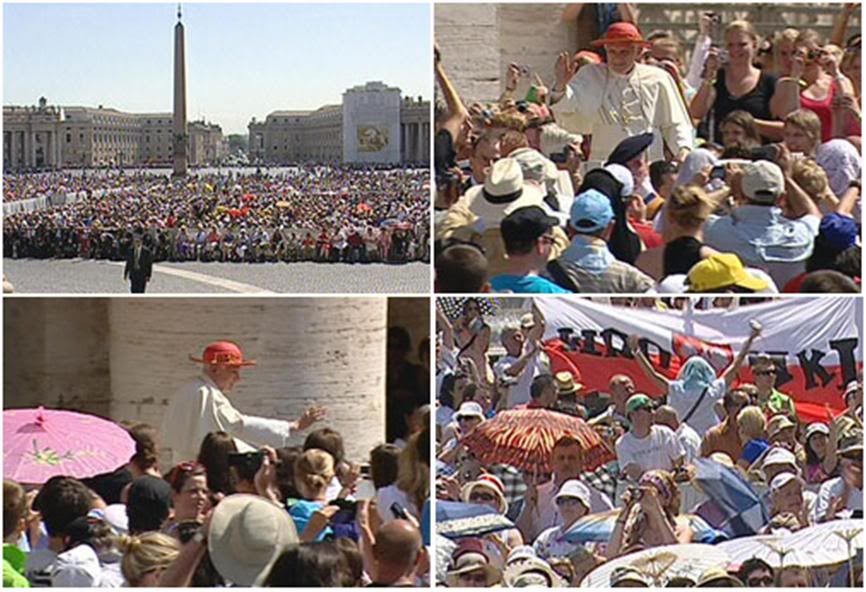 Pope calls on priests to bring
Pope calls on priests to bring
God’s mercy to the world

30 Jun 10 (RV) - Pope Benedict XVI dedicated his general audience today to the figure of a 19th-century Italian priest, St. Giuseppe Cafasso, who dedicated himself to bringing God’s mercy to those on the margins of the Church and society.
“In these days we celebrate the one hundred and fiftieth anniversary of the death of a great model of priestly holiness and apostolic zeal, Saint Giuseppe Cafasso, a priest of Turin, Italy, in the nineteenth century”, he said.
Cafasso was born in 1811 in the same Northern Italian town as St. John Bosco. At the age of 22 he was ordained a priest and went to work at the boarding school of St Francis of Assisi in Turin. There he remained for his entire life, becoming a spiritual father to many priests who devoted themselves to improving the spiritual and social conditions of the people of their time, priests such as St John Bosco.
The Holy father said :“San Giuseppe devoted his entire ministry to the formation of priests, to the spiritual direction and service to the poor, especially prisoners condemned to death”.
In Italian, the Pope added “he paid attention to the humble and in particular to prisoners who in nineteenth century Turin lived in inhumane and dehumanizing situations...He was a good shepherd, understanding and compassionate... The inmates were captivated, his presence consoled them, touching hardened hearts... The condemned to death were subject to a special human and spiritual treatment... (and) he accompanied 57 of them with deep love and respect until the end of their earthly existence".
In greetings at the end of his audience, Pope Benedict welcomed 12 Archbishops from English speaking countries who received the Pallium from him on Tuesday. Calling each man by name, he also greeted the large groups of faithful who accompanied their pastors to Rome, some from as far afield as Lesotho and Zimbabwe in Africa, from Korea and the Philippines, from England and the USA.
To them, their families and their churches at home he said: “Dear Brothers, I ask the Lord to strengthen all of you in your witness to the apostolic faith and in generous service to the flocks entrusted to your care”.
And taking his leave of the 25,000 people who packed St Peter’s Square despite the midday heat, he had a special word of thanks to a group of pilgrims from Schola Cantorum of Saint Peter’s Cathedral, Belfast, “for their praise of God in song”.
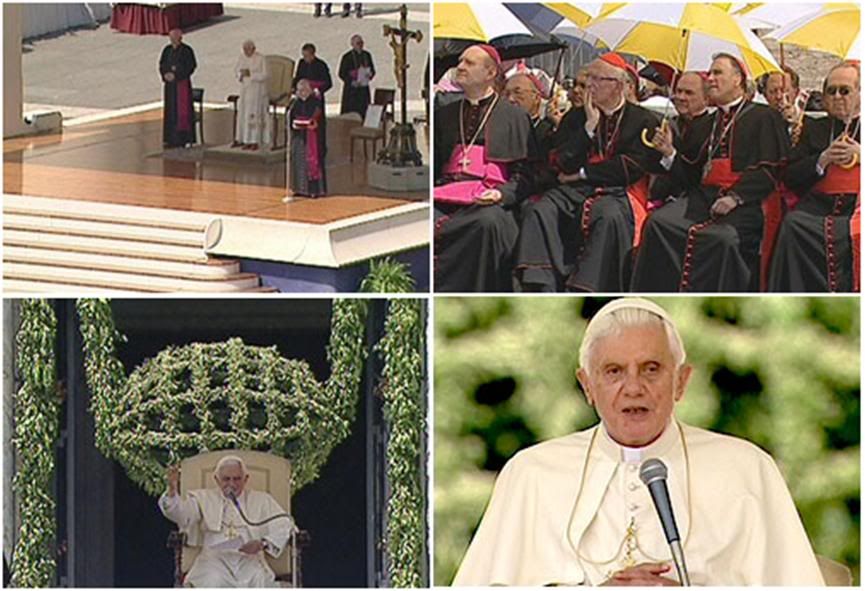
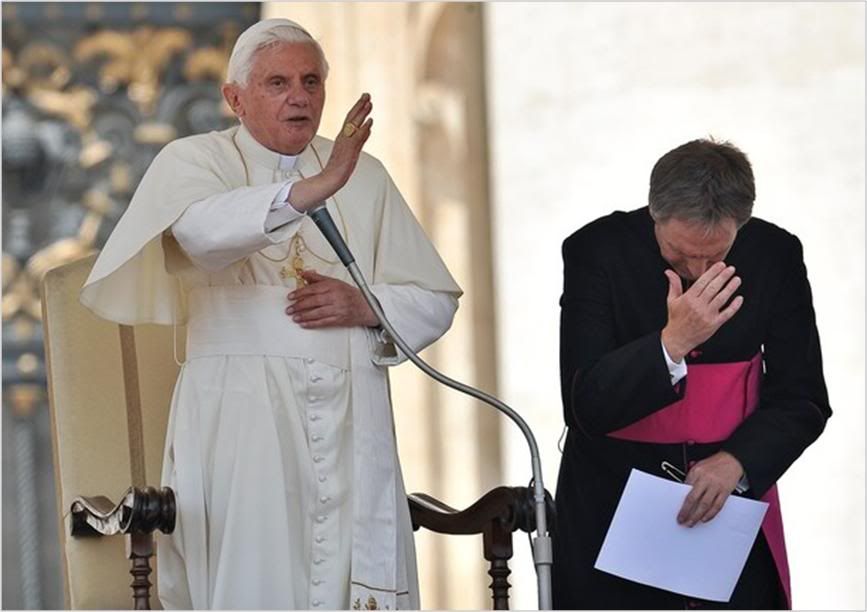
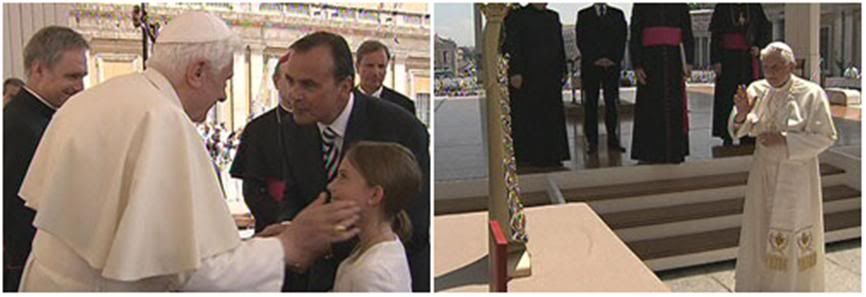 Benedict XVI is without a doubt the most photographed Pope ever to don a saturno - and the photographers can't seem to have enough of him...
Benedict XVI is without a doubt the most photographed Pope ever to don a saturno - and the photographers can't seem to have enough of him...
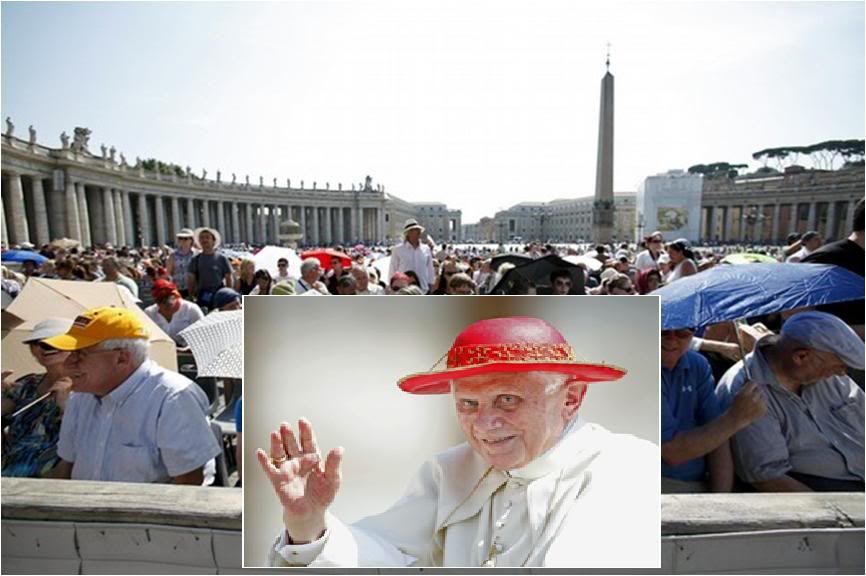
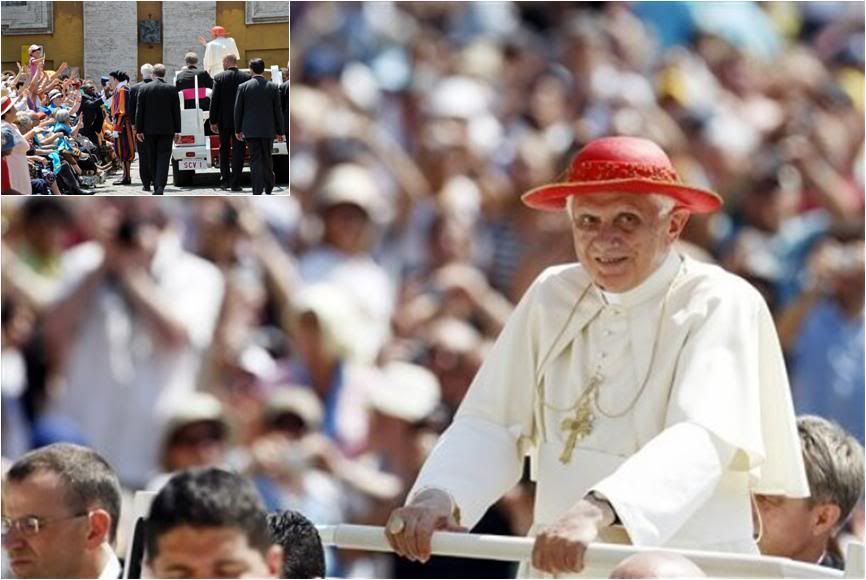
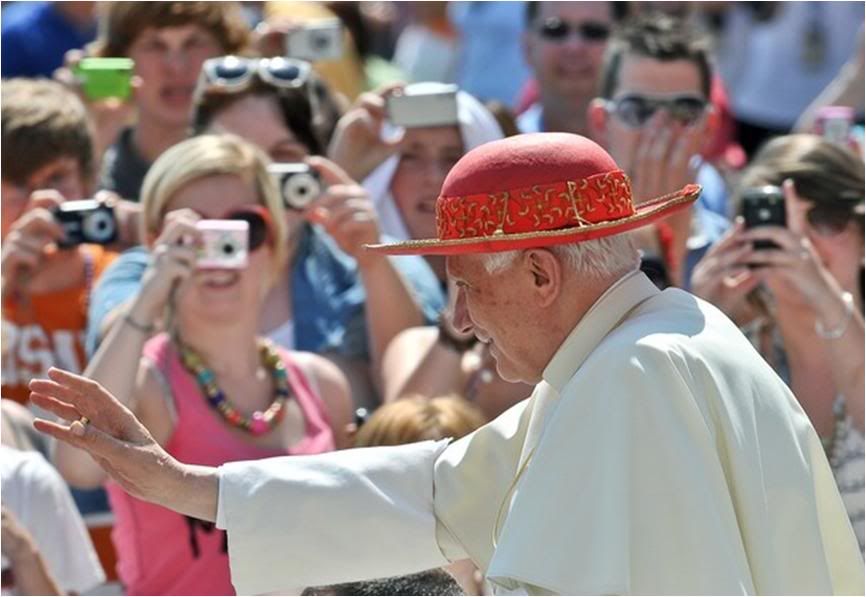
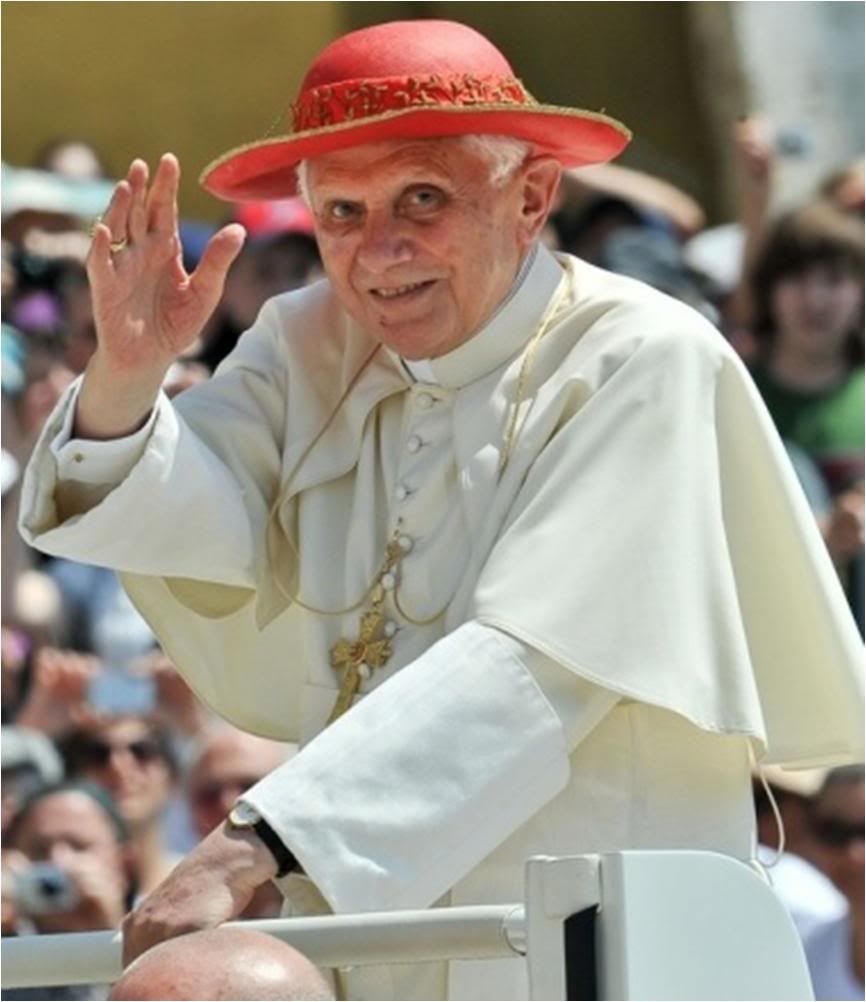
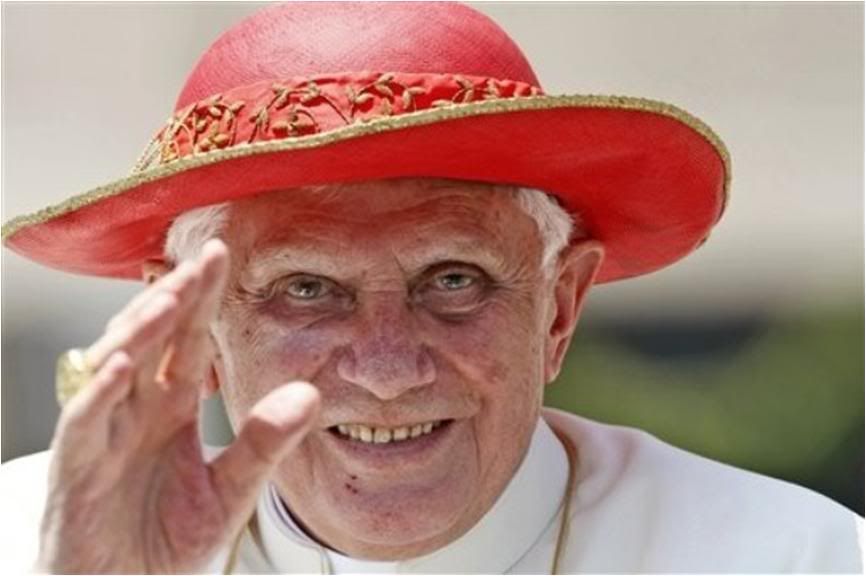
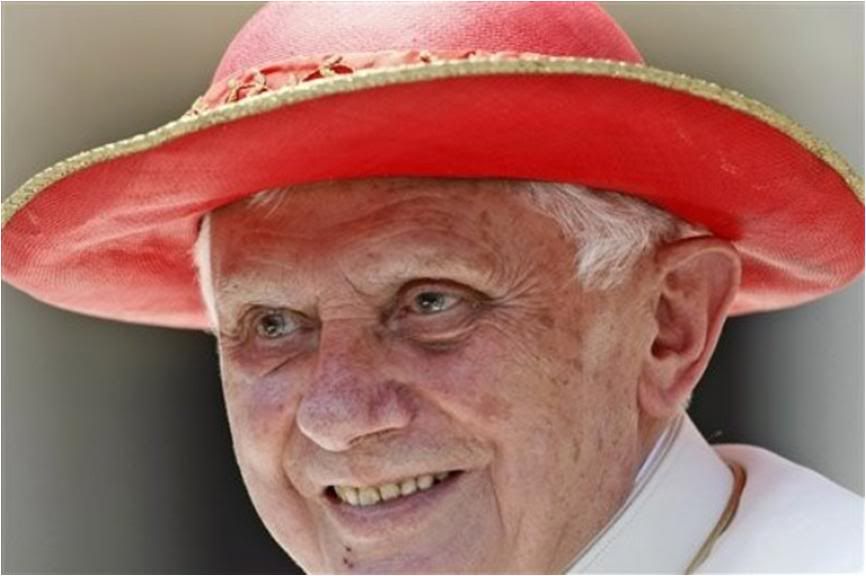
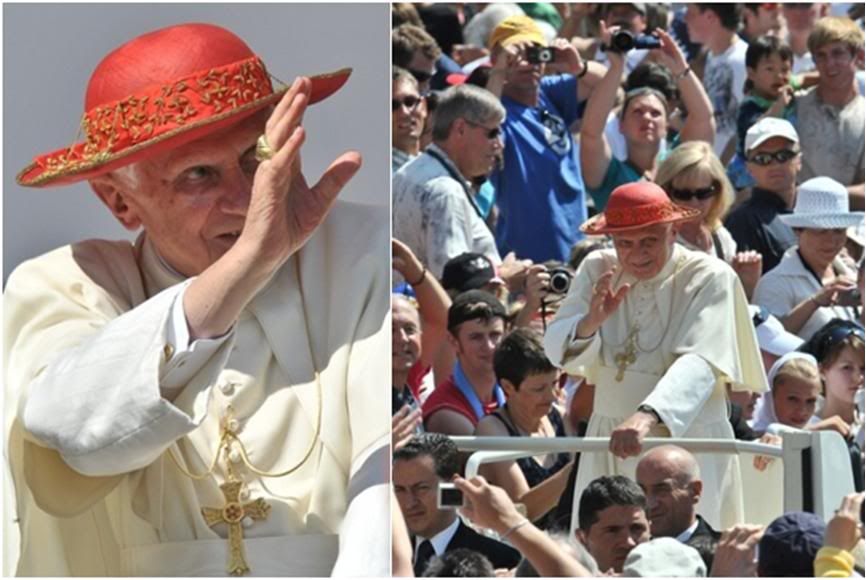
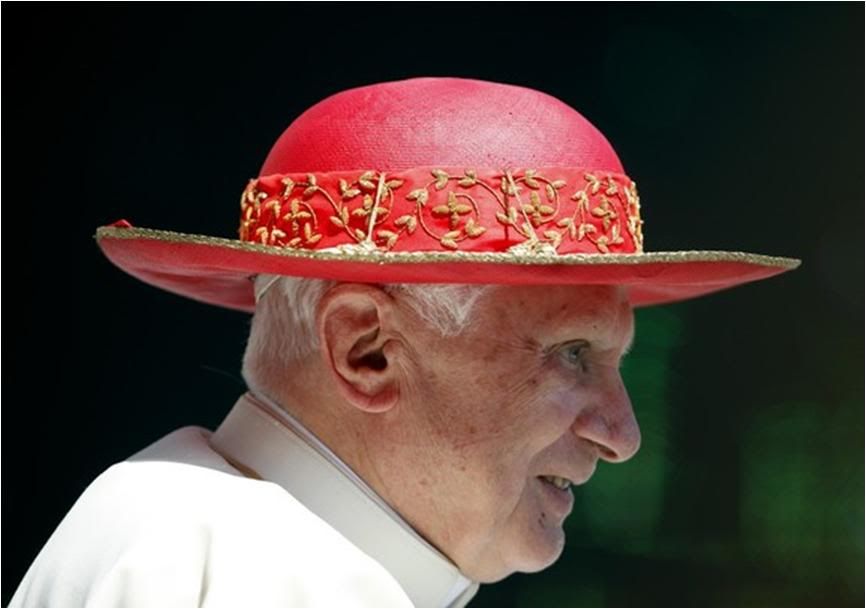
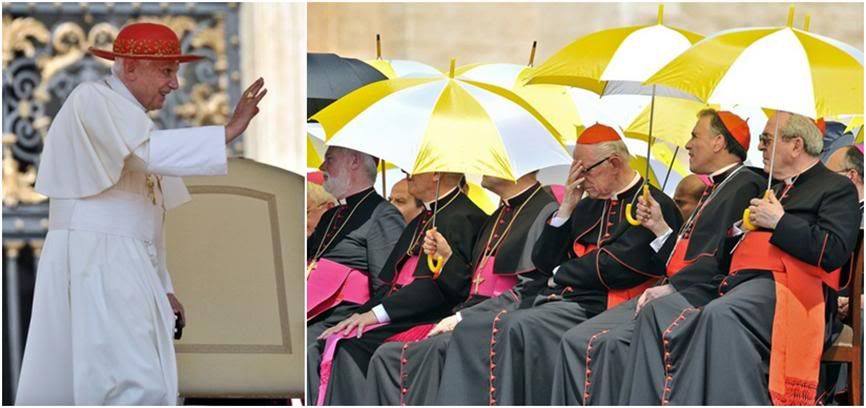
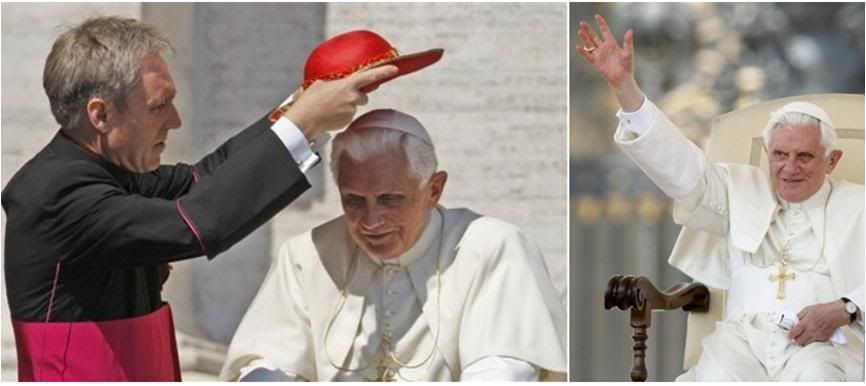
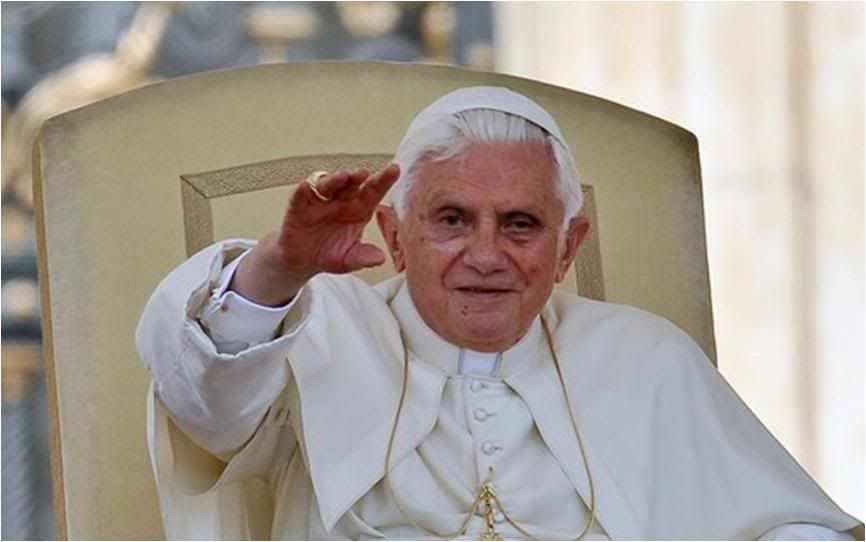
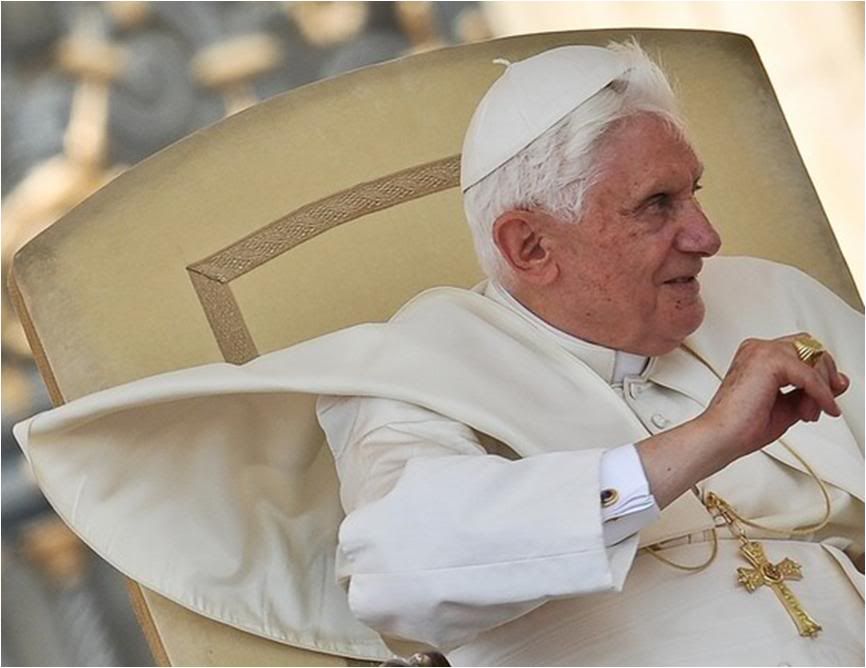
[Modificato da TERESA BENEDETTA 01/07/2010 02:45] |
| |
 30/06/2010 17:02 30/06/2010 17:02 |
|
| | | OFFLINE | | Post: 20.493
Post: 3.131 | Registrato il: 28/08/2005
Registrato il: 20/01/2009 | Administratore | Utente Master | |
|
 If the world's media did not have such a negative bias against Benedict XVI, worse now than when he was Cardinal Ratzinger depicted as a completely unpleasant Rottweiler by his detractors, what he has said and done in the past 18 months alone - from lifting the excommunication of the Lefebvrian bishops and his epochal letter to the bishops of the world, right down to his recent 'mesi mirabili' (that could have been 'mesi orribili' for anyone else) starting with the NYT-AP secular crusade to make him the scapegoat for all the sexual abuses ever committed by priests in the Church - would have earned him encomiums galore. And in an ideal world, even acclamation as a Pope who has been as courageous and tenacious a Successor of Peter as predecessors like Gregory the Great and Leo the Great.
If the world's media did not have such a negative bias against Benedict XVI, worse now than when he was Cardinal Ratzinger depicted as a completely unpleasant Rottweiler by his detractors, what he has said and done in the past 18 months alone - from lifting the excommunication of the Lefebvrian bishops and his epochal letter to the bishops of the world, right down to his recent 'mesi mirabili' (that could have been 'mesi orribili' for anyone else) starting with the NYT-AP secular crusade to make him the scapegoat for all the sexual abuses ever committed by priests in the Church - would have earned him encomiums galore. And in an ideal world, even acclamation as a Pope who has been as courageous and tenacious a Successor of Peter as predecessors like Gregory the Great and Leo the Great.
Meanwhile, we can comfort ourselves with articles like this. Fortunately, Corriere's Vaticanista, like his predecessor Luigi Accattoli, does not always take his editors' rigidly secular biases against Benedict XVI...
The theologian Pope
is also captain of his ship
by Gian Guido Vecchi
Translated from

June 29, 2010
Scandals, controversies, divisions. But beyond those, 'the eclipse of a sense of God' in societies with the most ancient Christian tradition.
"The challenges of the present era are certainly far above human capacities," Benedict XVI observed on June 29 at the Basilica of St. Paul outside the walls.
Nonetheless, he said, to the apostles "who showed their own impotence', Jesus 'demonstrated that with faith in God, nothing is impossible.
It was quite a day for Benedict XVI.
In the morning, he held a 'clarificatory meeting' between Cardinals Angelo Sodano, retired from office but still Dean of Cardinals, and the Archbishop of Vienna, Cardinal Christoph Schönborn - who had accused the former Secretary of State of offending victims of priestly sex abuse because he used the Italian word for 'idle talk' in an Easter Sunday tribute to the Holy Father [and worse, of colluding to shield the late Austrian Cardinal Hans Herman Groer from being investigated by the Vatican for alleged sex abuses].
According to an unprecedented note from the Vatican, Schoenborn had expressed his 'displeasure' at the 'misinterpretation' of his words. [More equivocation from Schoenborn, considering that there was nothing to interpret about accusations he expressed directly! BTW, the note does not say whether he apologized at all for his lapses in judgment and in elementary courtesy to a fellow cardinal!]
The Vatican note pointedly said that "in the Church, the competence regarding accusations against a cardinal lies exclusively with the Pope".
The same day, the Pope also authorized a note "to protect the good name" of the Congregation for the Evangelization of Peoples in view of the ongoing Italian government investigations of possible corruption among Italian government officials who had business dealings with that Congregation between 2000 to the early part of 2006.
And Monday night, at St. Paul's, the Pope announced the creation of a new Pontifical Council for 'new evangelization' of the West. In doing so, Benedict XVI recalled Paul VI's program for executing Vatican-II, John Paul II's missionary zeal (he also coined the term 'new evangelization'), and his own inaugural homily when he said, "The Church is young - it is open to the future".
"I repeat it now," he said, "at the tomb of St. Paul - the Church is an immense force for renewal in the world, certainly not by its own powers, but by the power of the Gospel".
At the Vatican, they are saying that more 'strong statements' will be made by Benedict XVI, after the Pope's letter deploring the way in which police raids were conducted against the Archdiocese of Mechelen-Brussels while reaffirming that "justice us take its course...but with respect for everyone concerned".
Starting with the most obvious. Contrary to the stereotypes that this Pope is a theologian isolated in the papal apartment, preferring to play the piano and remote or untouched by the problems of the Church, Benedict XVI is more than ever in charge at the Vatican and governs 'surely and serenely'.
Consider his new appointments to the Curia [now almost 100% his men], recent diplomatic successes with Russia and Vietnam, a rapprochement with Cuba, his attention to the Middle East and to China. (Yesterday, following online publication in Chinese of the Bible, the Catechism of the Catholic Church, and the Code of Canon Law, the Vatican published the documents of Vatican-II.)
In fact, just consider how he dealt with the Schoenborn problem which was "a strong affirmation of Petrine primacy", Vatican sources said.
[Vecchi goes on to cite the circumstances of the confrontation arranged by the Pope between Schoenborn and Cardinals Bertone and Sodano last Monday, and to cite from the Vatican note on the meeting.]
In short, Benedict XVI wanted both parties to resolve the problem and close the issue. These are difficult times and not the moment for a split along factional lines: the only 'line' is the Pope's, and he knows to correct what needs to be corrected.
Meanwhile, neither the note on Schoenborn or the one on Propaganda Fide appears to interest MSM in the least - because they do not fit the narrative they wish to impose on the Church and the Vatican - they have been terribly underplayed if not ignored! Though I am expecting some belated commentary from the Anglophone chattering class in defense of Schoenborn, their new liberal hero [i.e., 'Pupil turns against Pope'] and against Benedict XVI and the 'Vatican establishment'....
Even the normally forthcoming and voluble John Allen has not yet commented on what is surely a master tactical and strategic stroke by Benedict XVI - and totally unexpected (one expected the reprimand would have been kept private) - with respect to Schoenborn's insubordination, though Sandro Magister, who has not made a secret of where his sympathies lie, promises an examination in depth of the issue. Perhaps Allen is still trying to figure out how to 'justify' Schoenborn while trying to appear 'objective'!
[Modificato da TERESA BENEDETTA 01/07/2010 03:33] |
| |
 01/07/2010 12:58 01/07/2010 12:58 |
|
| | | OFFLINE | | Post: 20.494
Post: 3.132 | Registrato il: 28/08/2005
Registrato il: 20/01/2009 | Administratore | Utente Master | |
|
 Salesian Fr. Enrico Del Covolo was named by the Holy Father Wednesday to be the new Rector Magnificus of the Pontifical Lateran University - the 'Pope's university' since it is attached to the Cathedral of the Bishop of Rome.
Salesian Fr. Enrico Del Covolo was named by the Holy Father Wednesday to be the new Rector Magnificus of the Pontifical Lateran University - the 'Pope's university' since it is attached to the Cathedral of the Bishop of Rome.
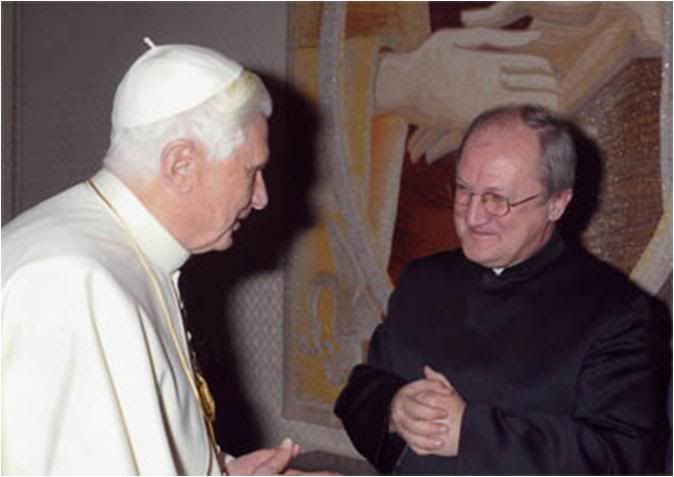
A few days earlier, Del Covolo came out with a new book about the exegetical aspect of Benedict XVI's Magisterium - his interpretation of Scripture. Gianni Cardinale interviewed the author for Avvenire.
Joseph Ratzinger's critique
of Biblical exegesis done
without 'the eyes of faith'
Interview by
Gianni Cardinale
Translated from

June 29, 2010
A characteristic concern of Benedict XVI"s Magisterium has been to find an approach to the Bible that recomposes the "devastating gap between exegesis and theology" through the method of 'canonical' as well as 'theological' exegesis.
To illustrate this dimension of Ratzingerian teaching even to regular folk, a dexterous book has just come out by Salesian Fr. Enrico Dal Covolo, professor of ancient Christian literature and consultor to the Congregation for the Doctrine of the Faith.
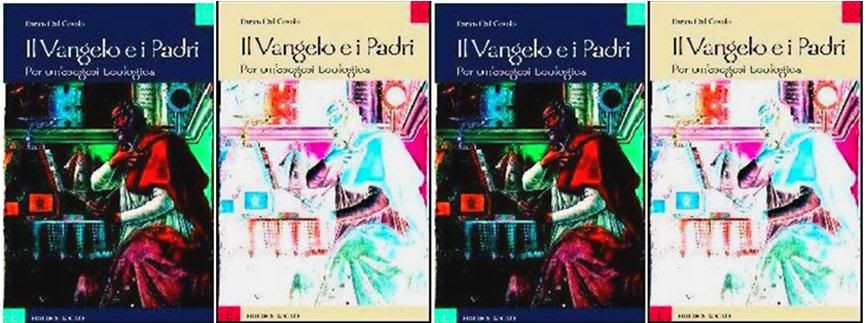
The book by the man whom Benedict XVI asked this year to preach the Lenten spiritual exercises for the Roman Curia is entitled Il Vangelo e i Padri. Per un’esegesi teologica (The Gospel and the Fathers: towards a theological exegesis) (Rogate, pp. 190, euro 16).
"With his JESUS OF NAZARETH," Del Covolo writes, Joseph Ratzinger-Benedict XVI marked a decisive stage in this urgent itinerary of
'uniting exegesis and theology'. The original intention of the Pope's book, was in fact to integrate the historico-critical method - which is praiseworthy, indispensable, but insufficient by itself - with some new criteria matured in the last two decades in various Catholic circles of theological-biblical research".
What are these 'new criteria' identified by the Pope?
First of all, a substantial trust in the historical reliability of data in the New Testament, in contrast to the academic methodology. Thus, a robust affirmation of the unity and continuity between the Old and New Testaments.
Then, a more 'ecclesial' hermeneutic (interpretative key) that is obedient to the living Tradition of the Church and the magisterium of her Fathers, considered as the primary interpreters of Scripture.
Finally, being more attentive to the so-called analogia fidei, namely the internal consonances and reciprocal correspondences among the various facts of the faith.
In short, no passage of Scripture can be correctly interpreted when one does away with its vital context, which is established by the faith of the Church, faith in Jesus Christ, the only Savior of the world.
This 'new method' - which the Pope calls 'canonical exegesis' - has allowed him to present the Jesus of the Gospels as the real Jesus, the 'historical' Jesus. So there is no longer a gap between Jesus of Nazareth and the Christ of faith: there is just one and very real Jesus Christ, who is the Son of God incarnated for our salvation.
[COLORE=#FF1601In your book, you explain how Benedict XVI has gone ven deeper into this course of "unity between exegesis and theology" with his intervention at the general congregation on October 14, 2008 at the Bishops' synod dedicated to the Word of God. In what sense?
On closer look, that intervention introduced an important element of 'newness ' regarding Jesus of Nazareth. The Pope assumes the 'new criteria' of 'canonical exegesis' to establish and propose a true 'theological exegesis'.
In that context, Benedict XVI reminded us that one can speak of theological exegesis only where the two methods - historico-critical and theological - are observed, an exegesis that is appropriate and adequate to Sacred Scripture.
But, he added "while current academic exegesis has been working at a very high level on the first method and has really been helpful, one cannot say the same for the theological method. And this has rather serious consequences".
What are those consequences?
The most serious is without a doubt the gap between so-called 'scientific or academic exegesis' and lectio divina, which is based on the 'spiritual or allegorical exegesis' of the Fathers.
In turn, this gap finds its roots in a now millenary reciprocal indifference between 'rational theology' espoused by those who claim to know everything by their own powers, and 'monastic theology' or 'theology on one's knees', in which true knowledge of God comes through the contemplative experience of his love.
What is the remedy?
A renewed approach to Scriptures such as Benedict XVI tells us, which makes urgent some return to the Fathers in matters of Biblical exegesis. But certainly not an acritical and anti-historical return that could compromise the conspicuous advances made in Biblical science, thanks lately to the use of the historico-critical method.
But it means, as the Pope himself suggested, a return to the Father5s that is capable of taking on "the new methods, carefully considered" such as a lectio divina that is in step with the times. This is the challenge that I wished to confront in this book.
The word is not mentioned at all in this interview but this 'return to the Fathers' - known by the French term 'ressourcement', or going back to the sources - is an important concept in the hermeneutic of continuity of Vatican II and was a guiding principle for the Council theologians like De Lubac, Congar and Ratzinger who saw the Council as 'a renewal in continuity with Tradition'.
[Modificato da TERESA BENEDETTA 01/07/2010 14:20] |
| |
 01/07/2010 15:05 01/07/2010 15:05 |
|
| | | OFFLINE | | Post: 20.495
Post: 3.133 | Registrato il: 28/08/2005
Registrato il: 20/01/2009 | Administratore | Utente Master | |
|
 Thursday, July 1, 13th Week in Ordinary Time
Thursday, July 1, 13th Week in Ordinary Time
 Fourth from left: Fray Serra's giant monument in San Francisco's Golden Gate Park.
BLESSED JUNIPER SERRA (b Mallorca 1713, d California, 1784), Franciscan, Professor, Missionary, Father of the California Missions
Fourth from left: Fray Serra's giant monument in San Francisco's Golden Gate Park.
BLESSED JUNIPER SERRA (b Mallorca 1713, d California, 1784), Franciscan, Professor, Missionary, Father of the California Missions
Born Miquel Josep Serra, this Catalan native joined the Franciscan order where he took the name of St. Francis's childlike companion, Brother Juniper. Until he was 35, he was an important professor of philosophy who was also famous for his preaching. Then he decided to become a missionary to the New World, arriving first in Mexico where for 18 years he worked in central Mexico and what is now known as Baja California. In 1769, when the Spanish territories in central America were threatened by a Russian invasion from the north, Serra and a fellow missionary headed north and founded the first Catholic mission in what is now San Diego. In the next two decades, despite unending physical and material difficulties, 8 more missions were founded, including the famous ones in Monterrey/Carmel, San Luis Obispo, San Juan Capistrano and San Buenaventura. (Twelve more would be founded after his death.) Serra also fought for and gained from the Spanish military commander of the region the first Bill of Rights for native Americans which protected the Indians by making the friars their legal guardians. Serra, who suffered until the end of his life from the consequences of a badly infected wound leg when he first arrived in Mexico, was sustained by prayer, often from midnight till dawn. He was an indefatigable traveller, mostly on foot, and personally baptized over 6,000 individuals and confirmed just as many. He brought native Americans not just the gift of faith but a decent standard of living, thus winning their love. He is buried in the San Carlo Borromeo mission in Carmel. He was beatified in 1988.
Readings for today's Mass:
www.usccb.org/nab/readings/070110.shtml
OR for 6/30-7/1:
 Photos show the Pope at St. Paul's Basilica visiting a new gallery of archeological finds and at the Vespers.
Photos show the Pope at St. Paul's Basilica visiting a new gallery of archeological finds and at the Vespers.
The Holy Father celebrates the First Vespers and Mass on the Solemnity of Saints Peter and Paul
'The Church is young and open to the future'
He announces a new Pontifical Council to promote new evangelization in secularized countries with an ancient Christian tradition
 Photos, from left: Vespers at St. Paul's; Angelus on Sunday; and St. Giuseppe Cafasso, subject of yesterday's catechesis, in a Turin church mural. Conspicuously missing is any photo of the Mass at which the Pope conferred the pallium on 38 new metropolitan archbishops.
This issue makes up for three days since Sunday when the newspaper did not appear because Sunday and Monday are both religious holidays, so it covers the Vespers on Monday, the Mass and Angelus on Tuesday, and the General Audience yesterday. Given prominent play on Page 1 is the letter from the Pope to Cardinal Tarcisio Bertone on the 50th anniversary of his ordination to the priesthood.
THE POPE'S DAY
Photos, from left: Vespers at St. Paul's; Angelus on Sunday; and St. Giuseppe Cafasso, subject of yesterday's catechesis, in a Turin church mural. Conspicuously missing is any photo of the Mass at which the Pope conferred the pallium on 38 new metropolitan archbishops.
This issue makes up for three days since Sunday when the newspaper did not appear because Sunday and Monday are both religious holidays, so it covers the Vespers on Monday, the Mass and Angelus on Tuesday, and the General Audience yesterday. Given prominent play on Page 1 is the letter from the Pope to Cardinal Tarcisio Bertone on the 50th anniversary of his ordination to the priesthood.
THE POPE'S DAY
The Holy Father met today with
- Mons. Angelo Amato, Prefect of the Congregation for the Causes of Saints. He signed decrees about
miracles that will lead to one sainthood and four beatifications, recognized the martyrdom of 21
individuals in the 20th century, and the heroic virtues of six others.
- Mons. Walter Mixa, emeritus Bishop of Augsburg. The Holy See later issued a note about the meeting.
- H.E. Pablo Cabrera Gaeta, Ambassador of Chile, on his farewell visit
- Cardinal Edmund Casimir Szoka, emeritus President of the Pontifical Commission for Vatican City State
and of its Governatorate.
The Vatican also formally announced the nomination of Mons. Kurt Koch, until now Bishop of Basel (Switzerland),
to succeed Cardinal Walter Kasper as President of the Pontifical Council for Promoting Christian Unity, and
his elevation to the rank of Archbishop.
THE POPE'S PRAYER INTENTIONS
FOR JULY 2010
General intention:
That elections in every nation may be carried out with justice, transparency, and honesty,
respecting the free decisions of citizens.
Missionary intention
That Christians may strive to promote everywhere, but especially in our cities, education, justice,
solidarity, and peace.
[Modificato da TERESA BENEDETTA 01/07/2010 15:33] |
| |
 01/07/2010 16:51 01/07/2010 16:51 |
|
| | | OFFLINE | | Post: 20.496
Post: 3.134 | Registrato il: 28/08/2005
Registrato il: 20/01/2009 | Administratore | Utente Master | |
|
 COMMUNIQUE ON THE HOLY FATHER'S
COMMUNIQUE ON THE HOLY FATHER'S
MEETING WITH MONS. WALTER MIXA
Translated from

July 1, 2010
On July 1, 2010, the Holy Father received the emeritus Bishop of Auggsburg Walter Mixa in a private audience.
In a communique on May 4, 2010, the Pope had accepted the bishop's request to be relived of his responsibilities as pastor of the Diocese of Augsburg and as Military Ordinary (Chaplain) of Germany. This decision was confirmed at today's audience.
Bishop Mixa will retire for some time in silence, meditation and prayer, and after a period of healing and reconciliation, he will be - like other emeritus bishops - available for pastoral tasks in accordance with his successor.
Bishop Mixa unerscored that he has always sought to fulfill his episcopal ministry well and conscientiously. But in all sincerity and humnility, he also acknowledged to haev committed mistakes and errors that have caused a loss of confidence that made his resignation inevitable.
He has once again asked forgiveness for all his mistakes, but rightly, he asks that all the good he has done may not be forgotten because of his errors.
The Holy Father expressed the hope that the bishops' plea for forgiveness may fall on open ears and hearts. After a period of often disporportionate polemics, the Pope hopes for reconciliation among those concerned, a new reciprocal acceptance of one another in the spirit of the Lord's mercy and in trustful abandon to his guidance.
Above all, the Supreme Pontiff asks his brothers in the episcopal ministry to offer Bishop Mixa - more than they have in the past - their friendly closeness, their understanding, and their assistance to find the right path.
The Pope calls on all the beloved faithful in the Diocese of Augsburg to promote reciprocal communion once more and to welcome with an open heart the bishop whom he will name as successor to Mons. Mixa.
At a time of conflicts and uncertainties, the world expects of Christians a common testimony that they can offer, on the basis of their encounter with the Risen Lord, and according to which, they can help one another as they can help all of society to find the right way towards the future.
Once again, the Holy Father has given his bishops and the world an example of Christian justice and mercy in dealing with the case of Mons. Mixa.
He makes clear that he had no choice but to accept Mixa's resignation because the bishop's actions had led to a loss of confidence by his diocesan flock. And by imposing a period of 'healing and reconciliation', he acknowledges the need for Mixa to make amends for his mistakes and errors.
Equally important, he rebukes, in effect, Mixa's fellow German bishops for their lack of Christian support for a brother bishop at a time when he was in need of it. Obviously, the Pope does not mean that they should have condoned his mistakes, but that they should have treated him fairly. (Calling a news conference to level accusations against Mixa without talking to Mixa beforehand was just the start!)
The other point implicit in this note is that once again, as in the case of Cardinal Schoenborn of Vienna, Benedict XVI shows he is ready to discipline even his personal friends when they need to be disciplined for the good of the Church.
Mixa's big mistake was to have denied at first that he had practised corporal punishment when he was a priest at a children's institution, only to admit it later, when additional charges were made that he had used some church funds to buy items to add to a private collection he kept as a hobby.
However, in the one specific case of sexual abuse subsequently added to the above, the supposed victim came out and denied that Mixa had ever behaved improperly with him, and a police investigation also concluded it could not find evidence for the accusation.
After his resignation, Mixa apparently spent a few weeks at a Swiss clinic for treatment, but after he came out two weeks ago, his former subordinates in the Diocese of Augsburg accused him of having a severe problem of alcoholism that had reportedly interfered with his episcopal duties, and for which he was supposedly treated at the Swiss clinic.
Yesterday, a German Catholic news agency obtained the clinic's report of Mixa's treatment which mentioned psychological problems but not alcoholism.
The 'unfriendliness' shown by the President of the German bishops' conference (Zollitsch) and the Archbishop of Munich-Freising (Marx) towards Mixa was sanctimonious, improper and un-Christian. The open hostility shown by Mixa's former subordinates in Augsburg - even after Mixa had resigned - is even worse.
However, Mixa's case is an example to other men of the Church. By all accounts, Mixa was an outstanding bishop who was also staunchly conservative - i.e., orthodox in his Catholicism - in a nation of notoriously liberal bishops. He was also a personal friend of Benedict XVI. (Mixa said two weeks ago that after he resigned, the Pope had sent him a 'loving fraternal letter'.]
This made his penchant for controversial statements of his orthodox beliefs problematic, because the media apparently came to treat him with the same sort of ridicule as they had for Mons. Wagner of Linz for his statement about hurricane Katrina. (A ridicule that reflected inevitably on Benedict XVI, since the MSM invariably identified Mixa as 'Benedict's personal friend').
Therefore, his initial denial of beating children as punishment in the 1970s - which, as he later pointed out, was practised in Germany until it was outlawed in 1980, so there was no reason for him to deny that he too practised it - made a mockery of his own Christian witness.(He should have remembered the example of Georg Ratzinger who, without waiting to be accused of corporal punishment, openly said yes, he slapped some boys to discipline them!)
Mixa's initial lie, along with possible misuse of Church funds for his own personal use, are serious blots on his record. And it is right that he make amends for them in the way the Pope has asked him to.
The other case study for men of the Church today is that of Cardinal George Pell. A single involvement in a case of alleged sexual abuse - even if he has been cleared of wrongdoing - forced him eventually to decline his nomination as Prefect for the Congregation for Bishops.
In this case, it is obviously unfair that the one case should hang over his head, as it will continue to do, even if he has been cleared, but given the nitpicking faultfinding general climate against the Church today, he could not have carried out his Curial function effectively with that fact being constantly attached to everything he says or does.
A third case, still unresolved, is that of Cardinal Sean Brady, Primate of Ireland and Archbishop of Armagh. I believe that as long as he has the support of his diocese (which he does, apparently), he has rightly resisted pressure from victims and their advocates to resign as Bishop because as a young priest, he interrogated two young victims of abuse by a Norbertine priest and asked them to sign what was then a standard statement of secrecy. Brady's bishop at the time dismissed the Norbertine back to his congregation which, unfortunately continued assigning the priest to pastoral work and reassigning him to escape prosecution for subsequent sex offenses.
Here is how the AP reports the Vatican note on Mixa - with a typically misleading headline and lead paragraph, implying that Mixa may resume work as a bishop again (even if not in Augsburg):
Pope lays out terms for accused
German bishop to resume work
By Nicole Winfield

VATICAN CITY, July 1 (AP) - The Pope on Thursday told a German bishop who resigned amid accusations of physical abuse, sexual harassment and alcoholism that he must take time for silent prayer, treatment and reconciliation if he wants to return to pastoral work.
Pope Benedict XVI laid out the terms for Bishop Walter Mixa's rehabilitation during a private audience with the 69-year-old prelate, during which Mixa again apologized for his mistakes, the Vatican said.
Benedict, for his part, "expressed the hope that his (Mixa's) request for forgiveness finds open ears and hearts" among the German faithful, the Vatican said.
Mixa's case marked an unusually public controversy that came to light at the height of the abuse scandal that rocked the Church in Germany and elsewhere in the first half of the year.
Mixa, who served as bishop of the Augsburg diocese from 2005 to 2010, offered his resignation on April 22 after accusations surfaced that he had hit children decades ago as a priest and amid allegations of financial misconduct.
The Pope accepted Mixa's resignation on May 8, but last month the bishop said members of the Augsburg diocese and two German bishops had forced him to resign against his will, and that he had written to the Pope seeking to rescind the resignation.
Fresh allegations later surfaced in the German media, including that Mixa was an alcoholic and had made sexual advances toward two priests.
Eventually Mixa apologized for his conduct and agreed to stand by the resignation.
The Vatican had said Mixa's resignation was never up for discussion [That's a gratuitous 'addition' by Winfield - it does not appear in the Vatican statement] and Benedict confirmed it definitively on Thursday. His title now is emeritus bishop of Augsburg. [But it already was, from the moment his resignation was accepted, as 'emeritus bishop' is the title of every bishop who resigns or retires!]
In a statement, the Vatican press office said Mixa will take a period of time for silent reflection and prayer — as well as treatment and reconciliation. Afterward, he will be available for undetermined pastoral work in agreement with the new Augsburg bishop, the statement said.
During the audience, Mixa said he recognized that he had made mistakes "which caused a loss of trust and made his resignation inevitable." He again asked forgiveness, but also asked that "all the good that he had done not be forgotten," the Vatican said.
Benedict urged Mixa's fellow bishops to understand and help him find the right path and for the faithful to welcome Mixa's successor.
P.S. Die Welt reports that the Holy Father has obviously rejected a petition from some priests and laymen in Augsburg not to allow Mixa to even live in the diocese after his retirement so as 'not to disturb the peace any further'. It just confirms how un-Christian Mixa's opponents have become! That appears to be the effect upon progressivist Catholics when 'conservative' Catholics gain prominence or ascendancy. But in this case, it persists even after Mixa has become effectively out of the mix!
The same news item has a long list of names that could possibly be considered to succeed Mixa in Augsburg which has 1.5 million Catholics - among them the Pope's former and current private secretaries, Mons. Josef Clemens and Georg Gaenswein.
Sueddeutsche Zeitung leads off its report on the papal audience for Mixa by underscoring the papal rebuke to other German bishops for the 'disproportionate polemics' and lack of fraternal respect to Mixa in the days before and after his resignation. The newspaper says the German bishops' conference refused to make a statement.
Which reminds me that Paolo Rodari reports of an unbelievable spin from the spokesman of Cardinal Schoenborn in Vienna who denies that Schoenborn was rebuked in any way by the Pope at their meeting last week.
It must be remembered that this amounted to a second rebuke by the Pope in as many meetings with Schoenborn. Last January 15, [S}right after meeting with the Pope, Schoenborn faxed from the Vatican a handwritten note of apology to the Bishop of Mostar- in whose diocese Medjugorje is located - apologizing for his failure to inform the Bishop personally when he visited Medjugorge on January 2 (in the company, one might add, of a full international media corps that documented his every move in Medjugorje, including his meeting with some of the 'seers' who claim to have received daily apparitions of Mary for the past 30 years. I wonder if Schoenborn asked if he could be present at the 'apparition of the day').
I imagined the Pope telling Schoenborn, "Please write that apology now. Mons Gaenswein will fax it for you!'
Also, not incidentally, soon after Schoenborn's 'pilgrimage', Benedict XVI named Cardinal Ruini to head a CDF commission of inquiry into the Medjugorje events to establish authenticity once and for all. Schoenborn, although he is a member of CDF, is not on the Commission.
[Modificato da TERESA BENEDETTA 02/07/2010 00:20] |
| |
 01/07/2010 19:05 01/07/2010 19:05 |
|
| | | OFFLINE | | Post: 20.497
Post: 3.135 | Registrato il: 28/08/2005
Registrato il: 20/01/2009 | Administratore | Utente Master | |
|

 BTW, I think it is time the PCPCU replaces its 'logo' of Saints Peter and Andrew, which depicts Catholic-Orthodox fraternity, but does not include the idea of the Reformed Churches.
Formal change-over at
BTW, I think it is time the PCPCU replaces its 'logo' of Saints Peter and Andrew, which depicts Catholic-Orthodox fraternity, but does not include the idea of the Reformed Churches.
Formal change-over at
Christian Unity Council
The Holy Father has accepted the resignation, for having reached canonical retirement age, of Cardinal Walter Kasper as president of the Pontifical Council for Promoting Christian Unity and has named Mons. Kurt Koch, until now Bishop of Basel, to succeed him, elevating Mons. Koch at the same time to the rank of Archbishop.
I was getting set to translate a long letter written by Mons. Koch to his diocesan flock which was posted on the diocesan webcite yesterday - which says a great deal about the kind of bishop he is and his thoughts about ecumenism, but CNS has a story that incorporates some of the letter, so here it is first....
Swiss bishop now heads
'Christian unity' council
as Cardinal Kasper retires
By Cindy Wooden

VATICAN CITY, July 1 (CNS) -- Pope Benedict XVI has chosen Swiss Bishop Kurt Koch of Basel to be the new president of the Pontifical Council for Promoting Christian Unity and of the Pontifical Commission for Religious Relations with the Jews.
Bishop Koch, 60, succeeds German Cardinal Walter Kasper, 77, who has been at the council for 11 years -- first as secretary, then as president since 2001.
The Vatican announced Bishop Koch's appointment July 1. It said the Pope had also named him an archbishop. [Koch says in his diocesan letter that the Pope has also named him concurrently Apostolic Administrator of Basel until a new bishop is named.]
In a letter to Catholics in Basel June 30, Bishop Koch said the Pope had asked him in February if he would take the job, stressing that he wanted someone who had both theological knowledge and practical experience in living and working alongside Protestant communities.
Pope Benedict's words, Bishop Koch said, demonstrate that improved relations with the Orthodox are not the Pope's only concern, but that relations with Protestants are just as important, since the unity of all Christians as the will of Jesus.
Bishop Koch has served as a member since 2002 of the Council he now heads, and is on both the international Catholic-Orthodox theological commission and the international Catholic-Lutheran dialogue commission.
In his farewell letter, the bishop -- a past president of the Swiss bishops' conference and a former professor of dogmatic theology and liturgy -- said that when he became bishop, he promised to personally answer every letter Catholics in Basel sent him.
"In recent years, however, so many new areas of work have been added and the time-consuming internal Church conflicts and polarizations have grown, so it increasingly became impossible for me to honor my resolution. For that I apologize," he said.
Born March 15, 1950, in Emmebrucke, he was ordained a priest for the Diocese of Basel in 1982. He studied at Lucerne University and at the University of Munich. After three years' service in a parish in Bern, he began teaching at Lucerne, eventually becoming rector of the theological faculty in 1995.
Following special traditional procedures, he was elected bishop of Basel by the priests of the cathedral chapter in August 1995 and Pope John Paul II confirmed the election four months later.
As president of the Swiss bishops' conference, Bishop Koch was called upon to help smooth tensions with Protestants in 2007 when the Vatican Congregation for the Doctrine of the Faith issued a document reaffirming Catholic teaching that the Catholic Church is the one, true church of Christ, even if elements of truth and Christ's saving grace can be found in separated churches and communities.
Bishop Koch said at the time that he understood how the document could be confusing or even hurtful to Protestants and to Catholics who usually refer to the Protestant communities as churches.
The document, he said, was looking at the term in a "strictly theological" way, explaining that if the Catholic Church believes apostolic succession and valid sacraments, particularly the Eucharist, are essential aspects of the church established by Christ, it cannot recognize as "church" those communities who do not have them.
The Rev. Olav Fykse Tveit, general secretary of the World Council of Churches, issued a statement June 30 saying the ecumenical organization rejoices at Bishop Koch's appointment.
"Bishop Koch is well known for his openness and deep ecumenical commitment. His book That All May Be One: Ecumenical Perspectives is an excellent summary of the present state of ecumenical dialogue and relations," Rev. Tveit said.
Meeting reporters June 25, Cardinal Kasper said that a challenge he faced repeatedly in his 11 years at the pontifical council was clarifying the Church's position when the wording of certain documents -- from the Vatican as well as from Orthodox and Protestant churches -- offended the other partner in ecumenical dialogue.
Particularly with the Anglicans and Protestants, he said, since the year 2000 there has been a noticeable loss of "the great enthusiasm" for the possibility of Christian unity that marked the years immediately after the Second Vatican Council.
"Errors, or better, imprudence in formulating the truth have been committed by both sides, including our own," he said.
Cardinal Kasper said his service at the council involved a lot of hard work, but the experience has left a deep mark on his life and his theological thought.
While he said he's ready at 77 to retire and get back to theological writing, he also said he will miss daily involvement in ecumenism, "which I always have considered to be the construction site of the Church of the future."
Despite some continuing misunderstandings and new difficulties caused by differences over key moral and ethical issues, the cardinal said he is confident that he is leaving behind "a solid network of human, Christian relationships," which is essential for finding the truth together.
"Passing the torch" to his successor and to a new generation of ecumenists, Cardinal Kasper said he is confident that ecumenism will continue to move forward because in an increasingly secular, increasingly globalized world, Christians have to work together.
Good personal relationships also existed with leaders of the Jewish community involved in dialogues sponsored by the Pontifical Commission for Religious Relations with the Jews, he said.
"At first, as a German I was afraid to take on this task, given the history of Germany and the Jews, but I must say our partners never mentioned this. I found not only partners, but many friends," he said.
When difficult moments arose -- including Pope Benedict's rewriting of a Good Friday prayer for the conversion of the Jews and his lifting the excommunication of a traditionalist bishop who denied the extent of the Holocaust [It must be repeated: The bishop's personal opinions, no matter how erroneous, have nothing to do with the reason for the excommunication!] -- the cardinal said the good personal relationships helped ensure the problems were clarified quickly.
"For us, this dialogue with the Jewish community is fundamental because the Church has its roots in the Jewish world. The relationship is essential for the Church," he said.
I cannot find any photograph online of Mons. Koch except the small picture that appears on the site of the Diocese of Basel, below left, and on the cover of a biography written about him in 2001, Un eveque pur notre temps (A bishop for our time).
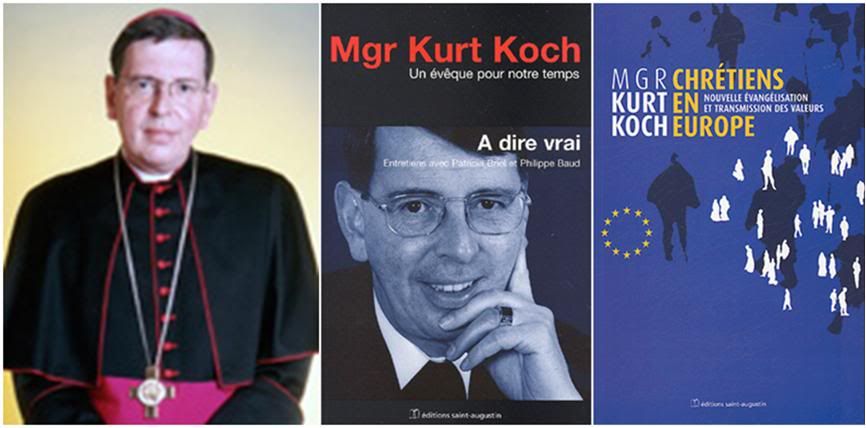 It also turns out that Mons. Koch has written at least two other books besides the title mentioned above, two of them written in 2004, Chretiens en Europe: Nouvelle evangelisation et transmission des valeurs, and Nouvel Age et Foi Chretienne (New Age and Christian Faith) written around the time Cardinal Ratzinger was sounding the call for a re-Christianization of Europe.
P.S. I apologize - I erroneously posted here earlier some book titles by 'Kurt E. Koch' which turned up in my Google search for books by 'Mons. Kurt Koch'. It turns out 'Kurt E. Koch' was a Protestant evangelist who wrote many books about occultism and Satan and how to fight their various forms. Not our Mons. Koch at all. Totally 'my bad'!
Two other pictures have now turned up of the Pope's new 'minister for ecumenism':
It also turns out that Mons. Koch has written at least two other books besides the title mentioned above, two of them written in 2004, Chretiens en Europe: Nouvelle evangelisation et transmission des valeurs, and Nouvel Age et Foi Chretienne (New Age and Christian Faith) written around the time Cardinal Ratzinger was sounding the call for a re-Christianization of Europe.
P.S. I apologize - I erroneously posted here earlier some book titles by 'Kurt E. Koch' which turned up in my Google search for books by 'Mons. Kurt Koch'. It turns out 'Kurt E. Koch' was a Protestant evangelist who wrote many books about occultism and Satan and how to fight their various forms. Not our Mons. Koch at all. Totally 'my bad'!
Two other pictures have now turned up of the Pope's new 'minister for ecumenism':
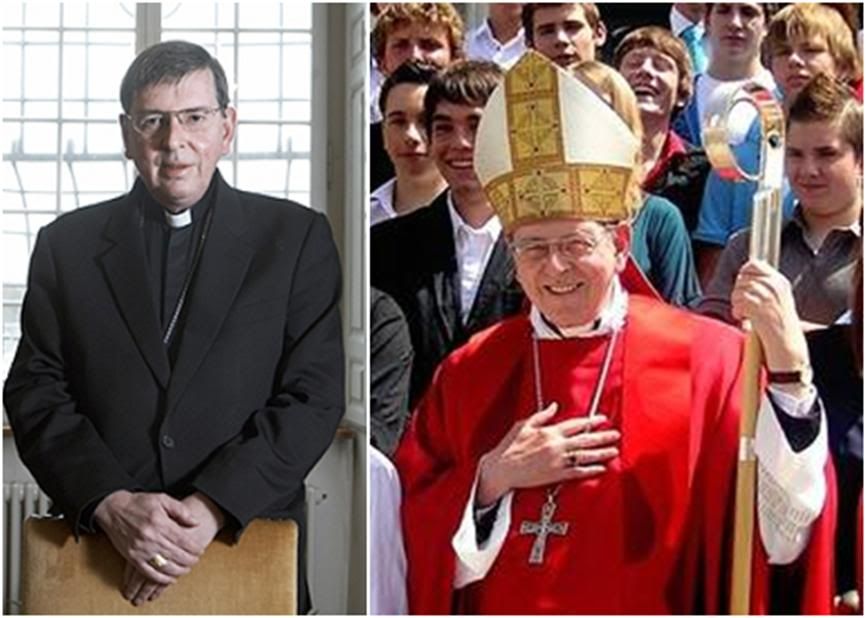 And here is a translation of Mons. Koch's pastoral letter to the Diocese of Basel about his new assignment. It is a most unusual letter, expecially in the part that Mons. Koch devotes to the intentions of the Holy Father.
PASTORAL LETTER TO
And here is a translation of Mons. Koch's pastoral letter to the Diocese of Basel about his new assignment. It is a most unusual letter, expecially in the part that Mons. Koch devotes to the intentions of the Holy Father.
PASTORAL LETTER TO
THE DIOCESE OF BASEL
by Mons. Kurt Koch
 Dear brothers in the Episcopate, the Priesthood and the Diaconate,
Dear brothers in the Episcopate, the Priesthood and the Diaconate,
Dear pastoral workers,
Dear faithful:
The Vatican will be announcing the news of my appointment by Pope Benedict XVI to be the president of the Pontifical Council for Promoting Christian Unity.
Last February, the Pope asked me if I would be ready to undertake that responsibility. He underscored how it was important to him that the position be entrusted once again to someone who knows the churches and ecclesial communities born after the Reformation not only through books but through direct experience.
The Pope showeed yet again how much he has ecumenism at heart, not only with the Orthodox but also with the Protestants. The unity of Christians is a mission mandated by Jesus Christ himself, and the urgency for it as well as its difficulties are evident today.
I am aware of the great honor and responsibility that the Pope is entrusting to me. I thank him for the confidence that he has thus shown me.
I am equally grateful for the important and decisive work done in the past several years by Cardinal Walter Kasper, whom I am succeeding. I have always believed in credible and sincere ecumenical dialog - both on the theological and spiritual level as well as in actual experience.
In 2002, Pope John Paul II named me a member of the Pontifical Council for Promoting Christian Unity, and as such, I was also a member of the international commission for theological dialog between the Catholic and orthodox Churches, and the international Catholic-Lutheran commission for unity.
With the task now given to me, I will be responsible for the ecumenical dialogs in which our Church is engaged. I will also be responsible for religious relations with Judaism, to which our Church is linked in a special way. I rejoice at this assignment and I hope to be able to serve, with all the forces at my disposal, to meet these challenges that have become so important since the Second Vatican Council.
On the other hand, it is not easy for me to leave the Diocese of Basel. For the almost 15 years that I led the diocese, it has become ever dearer to me. During this time, I came to know the esteem of many faithful, of pastoral workers, consecrated persons, members of various ecclesial communities and representatives of public institution, for which I am very grateful. [He goes on to give thanks to all those who have worked with him and to his colleagues in the Swiss bishops' conference.] Without their help and their loyalty, a bishop would in many ways be lost.
Nonetheless, I am aware of my limitations and weaknesses, of which I have become increasingly conscious with the years. I sincerely ask forgiveness from all those who - without knowing or intending - I have somehow disappointed or offended...
Inasmuch as bishops may not retire until they reach 75, I have 15 years left of episcopal service. In the face of the conditions under which the Bishop of Basel has to carry out his mission, I have asked myself if I could continue to bear the responsibility for another 15 years without giving in to fatigue.
I therefore consider my new post as a favorable occasion for a new bishop to take charge with new strengths, even as I happily take on a new challenge with renewed ardour.
I also hope that by responding to the Holy Father's call, I can contribute to better relations between the churches in Switzerland, as well as to the Pope's responsibility for the universal Church.
During recent years, I have observed within the Church in Switzerland a climate that has increasingly become 'anti--Roman' as well as an increasingly distant attitude to benedict XVI.
The claim that Pope Benedict would like to turn back to the situation before Vatican-II has become widespread in public opinion, whether from ignorance or intentionally, on the part of some theologians who should know better how things really are but instead publicly proclaim the contrary.
This reproach is a serious misunderstanding. To whoever does not content himself with the information - largely selective and a distortion of reality - that the different media disseminate, but who gets to know what the Pope really says and does, it is evident that Pope Benedict in no way wishes to turn back the clock.
On the contrary, he wishes to lead our Church to know herself in depth. For him, it is not simply a matter of making isolated reforms, but of allowing the foundation and the heart of Christian faith and the Church to achieve a new radiance.
In the same way that the Pope, looking at the history of the Church, sees in the 'Franciscan reform' a model for successful reform, he is working for a 're-formatio' of the Church from within, so that the Church may find its authentic form as it did in the Second Vatican Council.
We should all share this concern of the Pope, especially in view of the great challenge today of transmitting the faith to the coming generations.
So I am glad to be able to suypport the Holy Father in the exercise of his responsibility in a more immediate way, and I hope that the true intentions of Benedict XVI will be increasingly understood and disseminated by Catholic media, with increasingly less prejudice.
I will start my new mission on July 1, 2010, at which time I will already be in Rome. This means that the episcopal seat will be vacant as of July 1. But with a decree signed on June 29, the Pope has named me administrator of the Diocese, a responsibility which I will assume along with my new assignment in Rome until a new Bishop of Basel is named.
Therefore it is not yet a definitive departure for me. I will be returning to the diocese to wind up unfinished business. Also, inasmuch as there was hardly any time between the formal announcement of my nomination and my assumption of the new position, I have been unable to organize moving out of the residence nor to close still pending files.
It is now up to the Cathedral chapter to prepare for the election of a new bishop which will then have to be confirmed by the Holy Father. I ask you, dear brothers and sisters, to offer your prayers now for the election and nomination of the new bishop.
I must express once more my great appreciation for all the assistance an advice, the compassion, esteem and recognition that I have received in abundance. I thank above all the numberless faithful who have promised me their prayers and who already accompanied by episcopal service with prayer.
The most beautiful gift that a bishop can get is the multitude of persons who pray for him - this is a most precious aid. I hope that this union in prayer continues: neither distance nor customs restrictions can be an obstacle!
In such gratitude, my best wishes go with you, and I wish you the blessings of God with all my heart. May the living and infinitely merciful God extend his blessings abundantly on the Diocese of Basel and its future bishop, and may God be with the Cathedral chapter so they may be aided in their grand responsibility by the Holy Spirit.
To each and everyone, my most heartfelt greetings!
+ Kurt Koch
Bishop of Basel
[Modificato da TERESA BENEDETTA 01/07/2010 22:42] |
| |
 01/07/2010 21:02 01/07/2010 21:02 |
|
| | | OFFLINE | | Post: 20.498
Post: 3.136 | Registrato il: 28/08/2005
Registrato il: 20/01/2009 | Administratore | Utente Master | |
|
 Pope approves decrees
Pope approves decrees
for 43 causes, including
sainthood for an Italian priest
and the martyrdom of 26 more victims
of the Spanish civil War

VATICAN CITY, JULY 1, 2010 (Zenit.org).- Set to join 498 of their peers beatified in 2007 at the largest beatification ceremony in Church history, now another 26 victims of religious persecution in Spain during the 1930s have been recognized as martyrs.
Benedict XVI today authorized their decrees of martyrdom, as well as that of five others, along with five decrees recognizing miracles, and six decrees declaring heroic virtue. All but three of the decrees regard sainthood causes for people who died in the 20th century.
The one decree that will now lead directly to canonization recognizes a miracle attributed to the intercession of Blessed Luigi Guanella (1842-1915), an Italian priest who founded two orders, the Servants of Charity and the Daughters of St. Mary of Providence.
The other four to whose intercession at least one miracle has been attributed and certified are all 20th-century italians, one of whom died at 18. They will be known as Servants of God prior to formal beatification:
-- Giustino Maria Russolillo (1891-1955), Italian priest, pastor of Pianura and founder of the Society for Divine Vocations
-- Maria Serafina of the Sacred Heart of Jesus (1849-1911) (born Clotilde Micheli), Italian founder of the Sisters of the Angels
-- Alfonsa Clerici (1860-1930), Italian religious of the Sisters of the Most Precious Blood of Monza
-- Cecilia Eusepi (1910-1928), Italian member of the Third Order of the Servants of Mary.
The Spanish martyrs recognized by the Pope today, also preparatory to beatification, are:
-- José María Ruiz Cano, Jesús Aníbal Gómez Gómez, Tomás Cordero Cordero, and 13 companions of the Missionary Sons of the Immaculate Heart of the Blessed Virgin Mary, killed in 1936
-- Carmelo María Moyano and nine companions of the Carmelites, also killed in 1936.
The other martyrs:
-- Janos Scheffler (1887-1952), bishop of Satu Mare, Romania.
-- Johannes Prassek and two companions, diocesan priests killed in Hamburg, Germany, on Nov. 10, 1943
-- Marguerite Rutan, professed sister of the Daughters of Charity of St. Vincent de Paul, born in 1736 and killed at Dax, France, on April 9, 1794.
The 'heroic virtues' of six individuals, to be known henceforth as Venerable, were also recognized:
-- Basilio Martinelli (1872-1962), Italian professed priest of the Congregation of the Schools of Charity
-- María Antonia de San José (1730-1799) (born María Antonia de Paz y Figueroa), Argentinean founder of the Beaterio of Buenos Aires
-- Maria (1880-1940) (born Casimira Kaupas), Lithuanian founder of the Sisters of St. Casimir
-- Maria Luisa (1799-1847) (born Gertrude Prosperi), Italian abbess of the convent of the Order of St. Benedict of Trevi
-- María Teresa (1927-1946) (born María del Carmen Albarracín), Spanish professed religious of the Mary Immaculate Claretian Missionary Sisters
-- Maria Plautilla (1913-1947) (born Lucia Cavallo), Italian professed religious of the Little Missionary Sisters of Charity.
|
| |
 02/07/2010 00:13 02/07/2010 00:13 |
|
| | | OFFLINE | | Post: 20.499
Post: 3.137 | Registrato il: 28/08/2005
Registrato il: 20/01/2009 | Administratore | Utente Master | |
|
 As I was away most of the day yesterday, I was unable to post stories on Cardinal Ouellet's appointment to head the Congregation fro Bishops. Of all the recent appointments made by the Pope, this is the one that most directly and immediately affects dioceses around the world.
As I was away most of the day yesterday, I was unable to post stories on Cardinal Ouellet's appointment to head the Congregation fro Bishops. Of all the recent appointments made by the Pope, this is the one that most directly and immediately affects dioceses around the world.
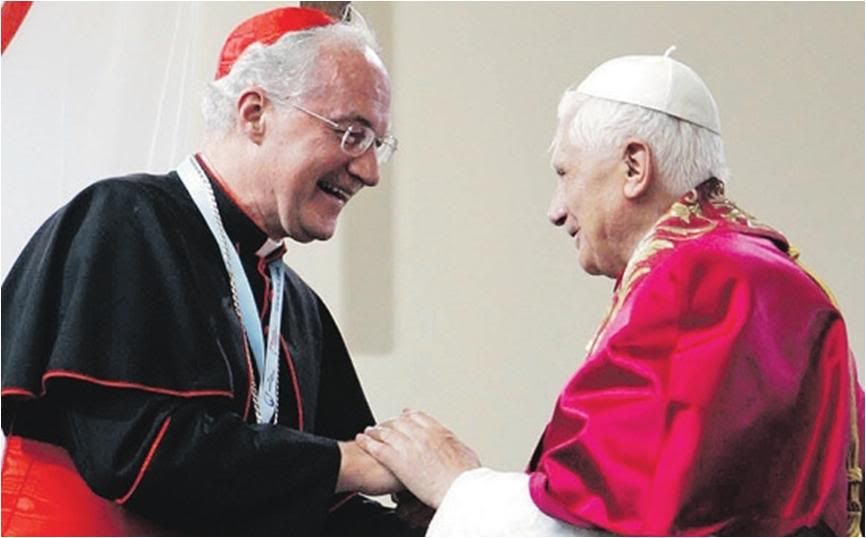
Cardinal Ouellet with the Holy Father, Cologne, 2005.
In many significant ways, the quality and theological orientation of bishops named by the Pope (after vetting by the Congrgeation for Bishops) shape the local Church they head.
Since the Congregation for Bishops was constituted in 1965, it has had five Prefects, two of whom were non-Italian: Cardinal Gantin of Benin who served from 1984-1998, followed by Cardinal Moreira Neves of Brazil who served from 1998 until his unexpected death in 2000. He was succeeded by Cardinal Re, whom Cardinal Ouellet succeeds.
Not surprisingly, the MSM reports about Cardinal Ouellet focused on his being 'controversial' because of statements he made recently defending Church teaching against abortion. Only in MSM's cockeyed world would a Catholic cardinal's defense of Catholic teaching be called 'controversial'!
Here is how Canada's leading news agency reported it:
Pope Benedict promotes
controversial Cardinal
to important Vatican post
by Andy Blatchford

June 30th, 2010
MONTREAL - The Vatican has promoted Canada's highest-ranking Roman Catholic priest, giving the controversial cardinal a powerful role in Pope Benedict's inner circle.
Ouellet, the Archbishop of Quebec and the Roman Catholic Primate of Canada, says he was surprised to get a tap on the shoulder from Pope Benedict.
"It is a mark of great confidence from the Holy Father and I am very grateful to him," Ouellet told a news conference Wednesday in Quebec City. "It is a huge responsibility."
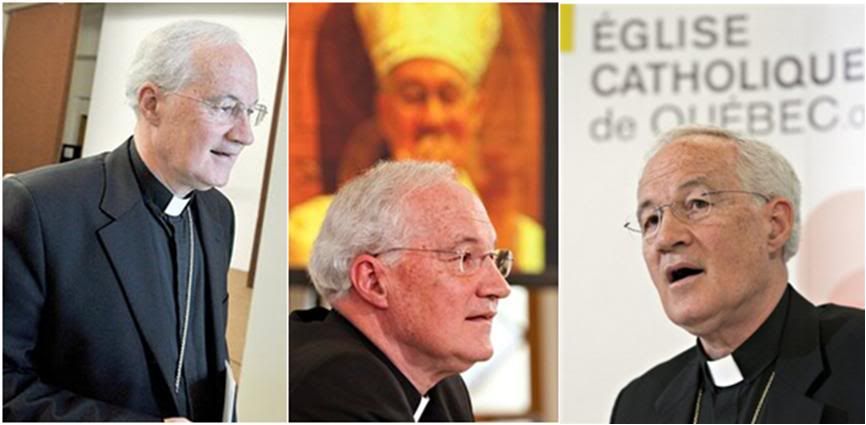 Left, Cardinal Ouellet in his office, May 2010; center and right, at his news conference in Montreal yesterday.
But the outspoken 66-year-old's road to the Vatican has been a bumpy one, and his time at the upper echelon of the Church in Canada has been marked by controversy. [And yet, this story only cites the abortion controversy! How has his road been bumpy and controversial otherwise?]
Left, Cardinal Ouellet in his office, May 2010; center and right, at his news conference in Montreal yesterday.
But the outspoken 66-year-old's road to the Vatican has been a bumpy one, and his time at the upper echelon of the Church in Canada has been marked by controversy. [And yet, this story only cites the abortion controversy! How has his road been bumpy and controversial otherwise?]
Ouellet, who has denounced allegations that the Pope covered up cases of sexual abuse by priests, was widely criticized this spring after he described abortion as an unjustifiable moral crime, even in rape cases.
He defended his remark as Church doctrine, but was condemned by the Harper government, Quebec provincial politicians and feminist groups. One newspaper columnist even expressed his wish that Ouellet would suffer a slow, painful death.
When asked Wednesday about the legacy he will leave behind, Ouellet answered he hopes people over time will better understand the choices he has made.
"The historians will have to do their work," he said.
The appointment will see Ouellet succeed 76-year-old Cardinal Giovanni Battista Re, who has retired after nearly a decade in the post.
Ouellet, once considered a possible successor to Pope John Paul II, also aims to help Pope Benedict reverse the Catholic church's ongoing decline in the Western world.
"It's a difficult time, it's a time of crisis, and so it is a time of decision," said Ouellet, who has known Pope Benedict for years.
"I've been supporting him in difficult times."
But those who disagree with Ouellet's firm stance on issues such as abortion are calling his appointment another distressing signal of the direction of the Church.
"In his capacity as an official of the Church, he should have been speaking up for the rights of those victimized within the
Church and for the rights of women in civil society," said Lee Lakeman, spokeswoman for the Canadian Association of Sexual Assault Centres. "When he can get pregnant, he can have an opinion."
But others, who wholeheartedly agree with his positions, are happy for Ouellet, even though they will miss him after he departs for Rome in the coming months.
"He has the courage to stand up and speak the truth when it's necessary," said Mary Ellen Douglas, national organizer for Campaign Life Coalition, a pro-life advocacy group.
"The only regret is that if he's moved to Rome then he won't be at the disposal of the people in Canada, so it will be a loss for us."
Ouellet's promotion to such a prestigious position is being lauded as a move that will raise the profile of Canada — and the cardinal himself.
"(It) can bring the point of view of the Canadians (to) the whole church," Montreal Archbishop Jean-Claude Cardinal Turcotte said in an interview.
Turcotte said Ouellet will not only be in a position to explain Canada to his peers in the Vatican, but also to Pope Benedict himself.
"Sometimes (Canada) is a little obscure for those who are living in Rome," he said.
Could this job promotion also be a springboard for Ouellet to eventually succeed Pope Benedict?
"I don't know," Turcotte said. "In the Church, it's not like in a political party — we don't prepare succession during the time of the Pope himself.
"But he will be in a place where he will be very well known by many, many bishops in the world. I think it's interesting that his personality is going to be observed by many, and we don't know the future. I prefer to leave that in the hands of God, than in the hands of the humans."
Turcotte said Ouellet did his duty as a Church official, even if his positions sometimes erupted into controversy.
"The position of the Church was given by Christ, by the gospel and by the theology, the tradition of the Church," he said.
"We can say that many of those positions are not very popular in society today."
Ouellet, a native of La Motte in Quebec's Abitibi region, became Archbishop of Quebec City in 2002 and was once secretary of the Pontifical Council for Promoting Christian Unity.
Other Canadians have played prominent roles in the Vatican, but Ouellet's position, which will propel him into the Pope's inner circle, is likely the most significant, says religious studies professor Douglas Farrow.
"Certainly he is someone in whom Pope Benedict invests a good deal of trust," the McGill University professor said.
Still, Farrow says this posting doesn't necessarily mean Ouellet is being groomed for the papacy, especially since there are several candidates who could eventually succeed Pope Benedict.
Ouellet doesn't think this position will move him to the front of the line, either.
"I don't think that I will become the Pope some day," he said.
Ouellet's promotion is part of a shuffle of the Vatican's top positions in what is being seen as an acknowledgment that efforts to reinvigorate Christianity in Europe need a boost.
The announcement also says Monsignor Rino Fisichella has been chosen to head a new Vatican office to fight secularization and re-evangelize the West. Fisichella has been head of the Pontifical Academy for Life, the Vatican’s top bioethics official.
The long-rumoured appointments were announced as the Pope wraps up key Vatican business before going on vacation for the rest of the summer at the papal retreat in Castel Gandolfo, in the hills south of Rome.
The story in the UK Guardian was even more slanted and almost hostile - again, no surprise:
Pope gives top job
to abortion hardliner
by John Hooper in Rome

June 30, 2010
The Pope handed one of the most powerful jobs in the Vatican to a cardinal who said recently that abortion was wrong, even in cases of rape.
The reshuffle also saw a senior prelate moved from the institution that helps frame the Catholic church's "pro-life" doctrines, after he appeared to question the announcement by another archbishop that the mother of a child rape victim had removed herself from the Church by arranging for her daughter to terminate her pregnancy.
Archbishop Rino Fisichella was transferred to head a new department charged with stemming the advance of secularisation, particularly in Europe.
[Actually, I felt it was a graceful exit for the Pope from the untenable situation created by Fisichella at the Academy for Life, even if it still seems not quite kosher to have a Vatican dicastery head on record as tolerating compromise on abortion.]
It is the appointment of Cardinal Marc Ouellet, however, that is likely to arouse most controversy. As prefect of the Congregation for Bishops, Ouellet, until now the archbishop of Quebec and primate of Canada, will be responsible for drawing up shortlists from which the Pope decides who is to get a bishop's mitre.
The prefecture is often regarded as the third most important job in the Vatican administration since its incumbent can prevent even the most gifted priest from rising to a position of leadership in the Church. [Not that anyone can come up with any instance when that has happened, at least not in the past two centuries! In the Church, over the centuries, somehow, the cream finds a way to rise to the top. The Holy Spirit surely can 'pave the way' for those who are destined to become Pope.]
Ouellet has in the past been touted as a successor to Benedict.
This year, Ouellet provoked what the Canadian Broadcasting Corporation termed a "firestorm of criticism" when he told an anti-abortion conference in Quebec City that terminating a pregnancy was a "moral crime" even in rape cases.
He said he understood that a sexually assaulted woman should be helped and her attacker held accountable. "But there is already a victim," he said. "Must there be another one?"
Pauline Marois, leader of the Parti Québécois, said she was outraged by Ouellet's views and accused him of trying to get abortion recriminalised – a claim a spokesperson for the archdiocese denied.
Four days after he made his remarks, the Quebec national assembly passed a unanimous resolution affirming women's right to free and accessible abortion. [But they would have done so whether Ouellet had spoken up or not! - except now, they had added spite for motivation.]
Last year, there was worldwide controversy when Archbishop José Cardoso Sobrinho of Olinda and Recife in Brazil said the mother of a nine-year-old girl who had been repeatedly raped by her stepfather had excommunicated herself from the Catholic church.
In response, in an article published on the front page of L'Osservatore Romano, the Vatican's official newspaper, Fisichella wrote: "Before giving thought to excommunication, it was necessary and urgent to safeguard the innocent life of this girl."
[That's a sketchy and simplistic presentation of the case, which involved Fisichella's failure to inform himself fully of the circumstances before he wrote the article, nor even to consult the Archbishop of Recife about the case as episcopal courtesy requires. His position was subsequently 'clarified' by the CDF, but he insisted to the Academy for Life that he was correct and had nothing to apologize for to anyone.]
He was replaced as president of the Pontifical Academy for Life by a Spanish prelate close to the conservative Opus Dei. Fisichella's appointment to head the nascent Pontifical Council for the Promotion of the New Evangelisation is not a demotion, but it marked the second time in a week that the Pope sent a clear signal that he would not tolerate public dissent [by his bishops and cardinals - who should try to settle differences in private, not wrangle disgracefully in public!].
On Monday, the Vatican announced that the Archbishop of Vienna, Cardinal Christoph Schönborn, had come to Rome to explain himself to the Pontiff after apparently questioning priestly celibacy and accusing a fellow cardinal of mishandling a prominent sex abuse scandal.
Another Canadian news agency chooses to focus on Cardinal Ouellet's potential as a 'papabile', with a ridiculous title - as if anyone (other than, I think, notoriously, Cardinal Tettamanzi) would publicly say he wants to be Pope:
Quebec cardinal claims
no designs on papacy
By Marianne White

July 1, 2010
Controversial Quebec Cardinal Marc Ouellet, who is heading to Rome to take over a high-profile position, insisted Wednesday he is not after the Vatican's top job.
The multi-lingual Ouellet has been touted as a possible successor to Pope Benedict XV,I and his new powerful job -- head of the Congregation for Bishops, the organization that picks which priests will become bishops -- ups his profile as a possible contender.
"I'm surprised to be today in this position, and I don't think that I will become Pope someday! I don't think so," Canada's highest ranking Catholic priest told a news conference in Quebec City.
He said his dream as a boy was to be a missionary and that he fulfilled that dream when he worked for 10 years in South America. The 66-year-old said he wants to concentrate on the task ahead which he described as a "huge responsibility."
John L. Allen Jr., a leading Vatican watcher and correspondent for the National Catholic Reporter, said Ouellet has been named to one of the three most powerful positions at the Vatican after the Pope.
"In any institution when you are in a position to determine who its future leaders are going to be, that makes you a big deal," he said in an interview from Rome. In 2005, when John Paul II's successor was chosen, Ouellet's name also came up in the list of possible candidates for the job.
Allen believes if Ouellet makes a good impression, it could boost his stock for the next papal election.
"This certainly gives him an opportunity to play on the global stage and if he does that well, it could certainly make him a strong candidate the next time around," he said.
The fact that Ouellet is a traditionalist and devotee of the Catholic right could certainly play in his favour, Allen added.
He said the appointment should be seen as a big vote of confidence from the Pontiff -- whom Ouellet has known for more than 20 years.
Ouellet added Wednesday: "I think the Pope has great trust in me and he knows that I have been supporting him in the difficult times that we've had to go through and I will keep supporting him.
"We are aware that in the Western world in particular, Christianity is going through difficult times. It's a time of crisis, so it is a time of decision, decision in favour of the Gospel and in favour of Christ."
The cardinal recently came to the defence of the Pope when he was accused of turning a blind eye to priests who were sexually abusing children.
Ouellet himself has been under pressure in Quebec to apologize in the Church's name to victims of sexual abuses by priests. Victims' rights activist France Bedard said Wednesday Ouellet doesn't deserve his promotion to the Vatican.
"What has he done for his people, for the victims of sexual assaults by priests? Nothing," Bedard said. "I'm wondering if this is really a promotion or simply an escape." [And who is she to think that? And why should we Catholics care?]
The Quebec cardinal, who is also the Roman Catholic Primate of Canada, is well known in his home province for his conservative views and hardline stance against abortion.
Ouellet set off a firestorm last month when he said abortion was an unjustifiable moral crime, even in the case of rape. He later defended his comments and called for a broader debate on abortion, adding he considers abortion a "serious moral disorder."
The comments provoked rebukes from several women's rights organizations and politicians in Quebec and Ottawa.
Ouellet acknowledged Wednesday he is not perfect and said he hopes Quebecers will remember him for more than only the controversies.
Ouellet was born in La Motte -- a small town near Amos in the Abitibi-Temiscamingue region -- on June 8, 1944.
He spent 13 years in Rome as chairman of dogmatic theology before becoming archbishop of Quebec City in 2002.
[Modificato da TERESA BENEDETTA 02/07/2010 03:42] |
| |
 02/07/2010 03:01 02/07/2010 03:01 |
|
| | | OFFLINE | | Post: 20.500
Post: 3.138 | Registrato il: 28/08/2005
Registrato il: 20/01/2009 | Administratore | Utente Master | |
|
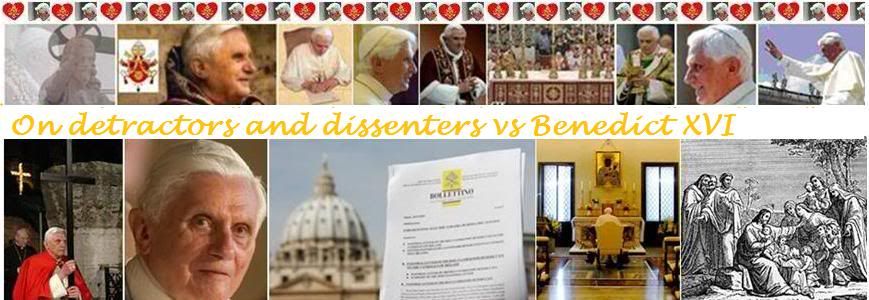 In a way, this commentary is superfluous, because some things are self-evident! Just because Benedict XVI has managed to beat and confound his enemies so far simply by being himself and true to the faith does not mean his enemies will not try to strike every chance they get... No one in the Church, least of all the Pope, is letting his guard down.
The disinformation goes on
In a way, this commentary is superfluous, because some things are self-evident! Just because Benedict XVI has managed to beat and confound his enemies so far simply by being himself and true to the faith does not mean his enemies will not try to strike every chance they get... No one in the Church, least of all the Pope, is letting his guard down.
The disinformation goes on
about the Church and Benedict XVI
by Gianteo Bordeo

June 30, 2010
Three years ago, I wrote that the Church led by Benedict XVI did not have a good press at all [Did it ever have one since April 19,2005, when some uncharitable UK newspapers headlined the news of his election by branding him a Nazi? And a German tabloid marked it by an almost completely black front page?]
There has been continual distortion of the Pope's words, arbitrary [generally negative] interpretations of his words, misrepresentation of his Magisterium and his acts of governance.
That things have not changed is confirmed by how most of the mass media reported two events in recent days. [Only by those events? What about the all-out assault mounted in March-April this year against the Pope himself????]
First, the news that the US Supreme Court did not take up the Vatican's appeal of a ruling by a federal appeals court allowing a suit to be brought against the Vatican by the victim of sex abuse by a Servite priest.
Summarily, the media reported it as a decision against the Vatican, pre-announcing - in many cases, not without gloating - that the Pope and his co-workers would soon be called to answer to a US court for events that took place more than 40 years ago!
Then, the media completely distorted the sense of the homily by Benedict XVI on the Solemnity of Saints Peter and Paul. Some TV newscasts or Italian papers made it appear the Pope had mounted an irate accusation against the Church itself, thus 'legitimizing' their verdict that the Church is nothing more than a miserable band of people dedicated to the worst crimes one can imagine!
Papa Ratzinger, of course, said no such thing, but in many press clippings of the day, he was once again the Grand Inquisitor this time lashing at the Church herself.
Now, this systematic disinformation regarding the life of the Church and the work of the Pope can certainly be explained - but not justified - in that the current system of information feeds on immediacy, on comments that are instantly disseminated on the Internet, on scandalous headlines that may not have anything to do with what the story actually says.
One might even say that newsmen do not always have the time to read an entire papal discourse [BS! Even his Christmas addresses to the Curia and the diplomatic corps - generally the longest of those he gives - will not require half an hour to read!], although the homily on July 29 was neither long nor complex!
Or, it could be said that the reason for such a habitual failure to understand the Pope's words is an ignorance of Catholic doctrine and the history of the Church - in short, that reporters lack the ABCs to correctly understand the reflections of a theologian as refined as Joseph Ratzinger. And in some cases, that is probably so.
[It's not as if Benedict XVI ever expresses himself in abstruse theological jargon incomprehensible to the uninitiated! It is just that some Rome-based correspondents who have covered the Vatican for years, even decades, continue to get simple things wrong about the Church, and their editors apparently do no editing at all - editing includes correcting facts - or do not know any better themselves. And they obviously can't be bothered to check their facts out. In the age of the Internet, when instant fact-checking is possible, that is completely unacceptable. Laziness, ignorance, bias, built-in hostility - today's journalists seem think they have no responsibility for anything at all except to grind out a story to meet their deadline, and especially, to push their ideological agenda while doing so.]
But it cannot be denied, considering published articles and broadcasts in recent days by the so-called 'secular media', that underlying the bad information on the Church and Benedict XVI is a firm and obstinate intention to place Catholicism in a bad light, to furnish public opinion with a distorted and negative image of the Christian experience, to propagandize - as the old Masonic and anti-clerical press did - the false as true, in a relentless ideological battle against a reality whose only fault is to propose to men in every age a truth which is 'a sign of contradiction' to the dominant worldly opinion, and against the usual way of conceiving the relationships of power, and power itself, whether it is cultural, political or mediatic.
A dramatic testimonial by the Bishop of San Marino, Mons. Luigi Negri, published in Il Foglio on June 29, is emblematic in this respect and compels reflection.
He wrote: "Those who attack the Church today also have a precise objective: to deprive Catholic parents of the right to educate their children as Catholics. In my diocese, from the time that the media started to drum up pedophilia among priests, parents have stopped taking their children to oratories (parish centers for community activities). In San Marino, we have never even had a single accusation of pedophilia against any priest. And yet, the parents are now wary!" [That's truly unfortunate, but does it not also indicate a 'weakness' of faith among the Catholics of the diocese? Surely the bishop and the priests can do something to allay their fears and strengthen their faith, especially if the diocese - located within a sovereign principality - has not had any case of priestly offenses!]
It is one thing to give out news and commentaries, even if often distracted and approximative, but quite another to foment, as so many information media are doing, a continuing witch hunt against the Church as a means of waging war against Catholicism, the Pope, and ultimately, the faithful, to whom it has been more or less suggested - to use a euphemism - not to entrust their children to priests, parishes, oratories, catechists, ecclesial movements, anything that has to do with the Church, because it would be unhealthy and unsafe for them.
No one, starting with Benedict XVI, denies the seriousness of the pedophile crimes committed by some priests, nor the need to expose such crimes and do everything to prevent them from happening again - or at least to minimize any such possibility.
But it is also evident that much of the media use it to fan the flames of hostility against the Church in its entirety - a campaign that must be opposed by anyone, secular or Christian, who respects freedom of thought, of religion, of education - and their full realization in so-called 'civilized' societies.
[Modificato da TERESA BENEDETTA 02/07/2010 03:49] |
| |
 02/07/2010 13:36 02/07/2010 13:36 |
|
| | | OFFLINE | | Post: 20.501
Post: 3.139 | Registrato il: 28/08/2005
Registrato il: 20/01/2009 | Administratore | Utente Master | |
|
 Sandro Magister writes the www.chiesa articles primarily for L'Espresso, the weekly newsmagazine, so he is not above tailoring his deadlines as secular publications do - for maximum shock value at first glance. I think the Sepe-Bertone confrontation he cites is tenuous and not borne out by available facts; that the 'wrangling' has been completely one-sided in the case of Schoenborn vs Sodano since Sodano has not taken the bait at all; and that the wrangling has been all too real between the liberal German bishops and the conservative Mixa, so the 'biting and devouring' has not been lmited to cardinals alone! With that caveat and a few others noted below, Magister makes his usual compelling presentation of Vatican Realpolitik in this article.
Prominent cardinals wrangle
Sandro Magister writes the www.chiesa articles primarily for L'Espresso, the weekly newsmagazine, so he is not above tailoring his deadlines as secular publications do - for maximum shock value at first glance. I think the Sepe-Bertone confrontation he cites is tenuous and not borne out by available facts; that the 'wrangling' has been completely one-sided in the case of Schoenborn vs Sodano since Sodano has not taken the bait at all; and that the wrangling has been all too real between the liberal German bishops and the conservative Mixa, so the 'biting and devouring' has not been lmited to cardinals alone! With that caveat and a few others noted below, Magister makes his usual compelling presentation of Vatican Realpolitik in this article.
Prominent cardinals wrangle
while Rome is under siege
Schoenborn against Sodano, Sepe against Bertone.
The serious case of the Archbishop of Vienna.
Benedict XVI chastises, pacifies and looks ahead with three key Curial appointments.

ROME, July 2 - It was a busy vigil for the Pope on the eve of the Feast of Saints Peter and Paul, patrons of the Church of Rome.
As always, he celebrated Vespers in the Basilica of St. Paul outside the Walls together with a delegation from the Ecumenical Patriarchate of Constantinople whom he received in audience at the Vatican in the morning.
In his homily he announced the creation of a new Vatican organism 'for renewed evangelization' of the countries with an ancient Christian tradition in which there has been "an eclipse of the sense of God".
But more than that, Benedict XVI had also worked hard to bring some peace among a few cardinals who had been in public confrontation in recent weeks. [I would not call the Schoenborn-Sodano case a confrontation since it was one-sided - all the aggression came from Schoenborn, while Sodano has chosen to keep silent! And Sepe against Bertone? Where did that come from?]
The Pope did so with two statements that were far from ritual, and with an equally unusual meeting with three of the wrangling cardinals. [I really do not understand what Bertone had to do with the Schoenborn-Sodano case. I thought the Pope wanted him present as an impartial third party and as his right-hand man.]
By a curious coincidence, the day before, Sunday, the readings for the day included that passage from St. Paul's Letter to the Galatians in which he admonished them: "If you bite and devour each other, take care that you do not end up destroying each other".
An admonition that Benedict XVI had cited in his memorable letter to the bishops of the world in March last year, issued after sharp dissent from many princes of the Church to his having lifted the excommunication of the Lefebvrian bishops.
The first of the two Vatican notes on June 28 had to do with the Congregation for the Evangelization of Peoples and Cardinal Crescencio Sepe who had led it from 2001-2006 before he was named ARchbishop of Naples.
Sepe was a power figure in John Paul II's Curia. But when an Italian court on June 20 opened an investigation to look into suspected irregularities in his management of the congregation's real estate properties, he immediately said that he had always done so with the approval of the Vatican Secretariat of State which was under Cardinal Sodano - involving Sodano in his case while at the same time implicitly challenging the present Secretary of State who had wanted him transferred to Naples.
[WHOA, Mr. Magister! Watch your timeline. Bertone did not become Secretary of State until Sept. 15, 2006, although he was named to the position in June 2006. However, Sepe was moved to Naples in May 2006 - an indication of how quickly the new Pope at the time wanted him out of the Curia (i.e., as soon as his Sepe's five-year term was over) - presumably because as Cardinal Ratzinger, he was aware of power-mongering in Propaganda Fide, by far the Vatican's most service-oriented dicastery and therefore an unlikely venue for any power play! In fact, it never was, before Sepe.
To now construe Sepe's appointment to Naples as being due to Bertone's preferences is not only factually wrong but also to ignore Benedict XVI's reasons for the move! Especially since, at the same time, he also moved out two other key players from his predecessor's Curia - the Secretary of the Congregation for Divine Worship, Mons. Domenico Sorrentino, whom he named Bishop of Assisi and replaced with someone who shared his views on liturgy, Mons. Albert Ranjith from Sri Lanka; and the president of the Pontifical Council for Inter-Religious Dialog, the British Archbishop Michael Fitzgerald, too kowtowy to Muslims, whom he named Apostolic Nuncio to Cairo, while he temporarily placed the CIRD under Cardinal Paul Pouupard, then president of the Pontifical Council for Culture.
That astounding triple play carried out one year after Benedict XVI became Pope caught everyone by surprise because all three were key figures in the Wojtyla era. Fitzgerald was notoriously and uncritically pro-Muslim - his 'demotion' was a harbinger of Regensburg and Benedict XVI's intention to renew the terms for inter-religious dialog, towards directness and honesty rather than kumbaya hypocrisy.]]
Sepe's statements in self-defense about his Propaganda Fide years caused some irritation in the Vatican which was apparent from the chilly detachment that L'Osservatore Romano has shown in failing to chronicle his current legal problem.
With its June 28 communique, the Vatican reaffirmed the exclusively missionary purpose of Propaganda Fide's income from its vast real estate holdings (estimated to be worth some 9 billion euros), while at the same time dissociating itself from any 'errors in judgment' that Cardinal Sepe and his closest associates may have committed in their personal capacities.
The second communique on June 28 had to do with the Pope's meeting that morning with Cardinal Christoph Schoenborn, Archbishop of Vienna.
He had made headlines in recent weeks for having repeatedly proposed 'rethnking' the practice of priestly celibacy and for having directly and earlier, sharply criticizing Cardinal Sodano for his words and deeds regarding pedophilia among priests.
His statements were all the more newsworthy because he is considered very close to Benedict XVI. He had been a student of his [ actually, he merely attended a semester's course in Regensburg] and had always been appreciated by him. Therefore, it is assumed by many that what he says somehow has the Pope's approval.
But not this time. Whether it was about celibacy or against Sodano, Benedict XVI was not pleased at all by Schoenborn's words and actions. And he reproved him for these, initially in personal letters, and then orally at this last meeting. [A first letter of rebuke, according to the Italian media, concerned Schoenborn's deliberately high-profile visit to Medjugorje.]
To dispel the impression that the Pope shares or approves Schoenborn's controversial views, a public gesture was needed. Which is what happened on June 28, when the private audience between the two [requested by Schoenborn] was enlarged to include Cardinals Sodano adn Bertone, followed by the Vatican communique about these meetings.
[Magister then puts in the full text of the communique.]
The note does not leave any room for doubt: Schoenborn had ashes piled on his head and must have had to recant what he said against Cardinal Sodano and about celibacy.
All this would not have been made so public by the Vatican were it not that Schoenborn's previous words and actions gained the media resonance that they did. Because what distinguishes the cardinal from Vienna from all the other cardinals is his skill in emerging as a protagonist on stage of public opinion - to whose inclinations and pressures he has shown himself to be quite attuned.
In fact, mediatic success almost always smiles on him. His allusions to a need to 'rethink' priestly celibacy were guaranteed to earn him widespread attention and approval.
He has never said that he agrees with the claims of the reform group 'We are Church' which originated in Austria and is most widespread there. But last Wednesday in Holy Week, he asked for the leaders of that group to be beside him in the Cathedral of Vienna as he asked forgiveness for sexual abuses committed by priests.
[Oh, and wasn't that the modern-day equivalent of the Pharisee beating his breast in the temple! Not that one can doubt Schoenborn's sincerity in fighting pedophilia and his concern for the victims, but the occasion was clearly a grandstand play to earn points with the media - if not with his all-too-liberal flock who gloat that he yields to them in many ways that, however, have not and will not bring them one step back towards Catholic orthodoxy - or to official Church membership, for that matter. Not even if he guarantees that the Church in Austria will pay the church tax for them!]
Thus, in the Church's efforts to fight unnatural sins in the clergy, Schoenborn comes off in the eyes of the media as the most decisive advocate of so-called 'transparency' - in which complaints of sexual abuse are systematically referred to the justice system and to complaints commissions that are independent of the Church hierarchy.
[What has the Church of Austria actually done besides naming this lay commission with great hype? And my personal beef with Schoenborn, IMHO: What about all the cases of Austrian priests living in open concubinage which, in terms of sinning, are just as scandalous as priests committing sexual abuse? Has he and the other bishops of his conference - all seven of them - ever done anything about the problem, if only to denounce it???? Nooooo... At least nothing public!]
In attacking Cardinal Sodano for alleged insensitivity and ineptitude in the matter of priestly pedophilia [with reference to the late Austrian Cardinal Hans Groer], Schoenborn chose a too-easy target, a figure who has alfeady been the target of many criticisms [in office and out of it]. [The one other breach of good taste by Schoenborn here was that he claimed he was accusing Sodano in defense of then Cardinal Ratzinger! If Benedict XVI needs any defense at all, he certainly does not want it to be at the expense of the Church and of an individual who is innocent until proven guilty!]
But what really concerns the Vatican and the Pope himself is the weak overall leadership of the Archbishop of Vienna in the Austrian Church.
In the 1980s, Cardinal Ratzinger entrusted Schoenborn and a select group of cardinals with drafting the Catechism of the Catholic Church. But shortly after he became Pope, when Benedict XVI received the Austrian bishops on their ad limina visit in November 2005, he rebuked them precisely for teaching Catholic doctrine 'in an incomplete way... omitting those that people do not want to hear or that could arouse protests or derision". And Schoenborn was among those bishops.
In June 2009, the Austrian bishops were called to Rome once more for a talking-to. Evidently, the Pope felt they had not learned anything from his 2005 critique. [Nor from what he said when he visited Austria in 2007, for that matter!]
In the months before that last audience, a majority of Austrian Catholics and clergy protested the Pope's nomination of Mons. Gerhard Wagner as auxiliary bishop of Linz, since they considered him too conservative.
Schoenborn and his fellow bishops let the protests run their course and within a month, the Vatican yielded and withdrew the nomination, to the rejoicing of all those who think that the main criterion for selecting a bishop should be his popular appeal. [Magister fails to point out that the Austrian bishops' conference, in fact, issued an almost offensive statement at the time, criticizing the way bishops are appointed by the Pope, and, if I remember correctly, also the lifting of the Lefebvrian bishops' excommunication.]
The Vatican also issued a communique after the June 15-16 meetings of the Austrian bishops with the Pope.
The June 28 note about the meeting with Schoenborn was therefore the third public rebuke in a row. Meanwhile, another ad limina visit is looming (it will be five years since the last one), and one imagines that this will be yet another occasion for a public rebuke from the Pope.
This does not mean that Papa Ratzinger does not continue to appreciate some qualities in Schoenborn who in his heart of hearts is absolutely orthodox. [One wonders how Magister can claim to know Schoenborn's 'heart of hearts! One does not have to look that deep to see that the Archbishop of Vienna has been self-serving in all this, not the least because only an insensitive person would fail to see that his media-targeted Me-Tarzan-brave-man papabile posturings are hurtful to the Church and to the Pope, that he is self-aggrandizing at the expense of the Church and the Pope.]
When the Ratzinger Schuelerkreis meets at Castel Gandolfo next August for their annual seminar, Schoenborn is set to deliver the opening lecture on this year's topic, the interpretation of Vatican II.
But Joseph Ratzinger is also aware of Schoenborn's faults, above all the inconsistency between what he thinks - which is completely in line with the Pope [Again, how can Magister presume to claim this?] - and what he says or does in order to be heard and to gain public favor. [Is that not a very grave defect? It is sheer unprincipled hypocrisy! It is even unthinkable that the editor of the Catechism of the Catholic Church should now be advocating that the Church rethink what it says and practices about priestly celibacy.
And BTW, the Pope's statements recently to explain the many different bases of priestly celibacy were, in effect, direct ripostes to Schoenborn's sallies!]
Turning back to the June 28 communique, there is a part that must be explained - when the Pope rebukes Schoenborn for the accusations against Sodano with regard to the 'late lamented' Cardinal Hans Hemann Groer, Archbishop of Vienna from 1986-1995.
In effect, Schoenborn accused Sodano of having covered up for sexual abuses committed by Groer.
Did he, in fact, commit them? Groer never admitted any culpability, nor was he ever subjected to any trial, canonical or civilian. [In fairness to Schoenborn, he claimed a few months back that Cardinal Ratzinger had pressed for a formal investigation of the charges against Groer but that the 'diplomatic' wing of the Curia overruled him. However, if that was so, then they had the concurrence of John Paul II - or to put it more directly, John Paul II sided with them against Cardinal Ratzinger on this particular matter. Then, qui bono, Cardinal Schoenborn, out of all your futile obsessing about Groer? You already condemned him by publicity back in 1996 and you have done so again repeatedly this year!]
Il Foglio published the most precise summary of the Groer case yesterday, as follows:
The Groer case broke out in 1995 when, after ccusations of sexual abuses disseminated by the media, the Vatican accepted the resignation of the cardinal when he turned 75. Named to replaces him was Schoenborn himself, who within a few months, rose from auxiliary bishop to coadjutor bishop and then Archbishop of Vienna. In that early phase, the young Dominican bishop was not among those who denounced the Benedictine Groer for culpability.
But the case re-exploded virulently in January 1998 when some of Groer's fellow Benedictines levelled accusations at him. The consistory that would make Schoenborn cardinal was scheduled for February, and he started to do all he could to keep Groer from attending it. By that time, the new Archbishop of Vienna had concluded that Groer was guilty as charged.
However, John Paul II not only did not prevent Groer from coming to Rome but even recieved him in a private audience on February 20.
When Schoenborn got back from the consistory, the Permanent Council of the Austrian bishops held a meeting - Schoenborn with Bishops Kappellari, Eder, Weber and Aichern - at the end of which four of them signed a note declaring they were 'morally certain' of Cardinal Groer's culpability. Aichern, a Benedictine - perhaps knowing better than the other four about the infighting in the Congregation hat led to the accusations agains Groer - did not sign the statement. [Was it not the height of presumption - and once again, Pharisaism - to publicly express 'moral certainty' about grave sins (crimes, in fact) committed by a fellow bishop without benefit of a formal hearing? It's the same pharisaism shown by the German bishops with regard to Mons. Mixa - in which they summarily acted as prosecutor, judge, jury and executioner without due process! And these are the very same people who moan and groan about the lack of democracy in the Church! Accused persons have rights, too, and in a rule of law, a person is presumed innocent until found guilty by due process!]
At this point, Schoenborn marched off to Rome to ask the Vatican to ratify the bishops' condemnation of Groer. But without success. The rejection was expressed - in clear and blunt terms - during Holy Week of 1996, when John Paul II and Cardinal Sodano met with Bishops Schoenborn, Weber and Eder to tell them that the Holy See did not find their denunciation probative. Nonetheless, after Easter, the retired Groer issued a statement asking for forgiveness from those he may have offended, although he did not admit to any wrongdoing.
In June of that year, John Paul II visited Austria. Schoenborn and his like-minded colleagues asked that Groer be excluded from any events and that the Vatican express a condemnation of him. The Pope agreed to the first, not to the second. Groer went abroad for a few months and then returned to Austria.
He died in 2003, without a word of condemnation from John Paul II, the only one who had the power to do so [outside of a canonical or civilian tribunal], as the communique of June 28 makes clear.
[The article continues by summarizing the new Curial appointments and the Pope's meeting with Mons. Mixa yesterday.]
[Modificato da TERESA BENEDETTA 02/07/2010 16:18] |
| |
 02/07/2010 14:27 02/07/2010 14:27 |
|
| | | OFFLINE | | Post: 20.502
Post: 3.140 | Registrato il: 28/08/2005
Registrato il: 20/01/2009 | Administratore | Utente Master | |
|

Bad news! The New York Times has apparently 'regrouped' its forces and resources and has launched Chapter 2 of its bringing-down-Benedict soap opera of character assassination, with a lengthy hodgepodge of their usual lies, half-truths, distortions and misrepresentations, based this time on their belated and patently erroneous claim that the Congregation for the Doctrine of the Faith (and its predecessor dicastery) had been charged since 1922 with adjudicating sexual offenses by priests but Cardinal Ratzinger did not lift a finger to exercise such authority until the Vatican was forced by the US scandals to give him explicit orders to do so!... What the writers ignore is the very obvious fact that the local bishop has always had the authority and discretion to discipline an erring priest to the point of having him defrocked by the Vatican, but nonetheless, to inveetigate him and bring charges if appropriate before a Church tribunal and report any criminal act to the police. They did not need the CDF to do that. Only, in the case of the sex abuse offenses, few of them did that - at least not before the start of the decade after the scandal broke wide open in the US.
www.nytimes.com/2010/07/02/world/europe/02pope.html?_r=1&ref=world&src=me&pagewa...
Not worth reading, and certainly not, at this point, even fisking! EEWWWWWW...
The good news is that it has not come up with anything new that is even 'apparently damaging' in what is nothing more than a diabolical rehash of all the falsehoods about the role of the CDF most flagrantly exemplified by the BBC documentary of 2006 which concocted the most outrageous of lies into a toxic brew. But the Times is counting that this 'new' story will reignite the public brouhaha they successfully created back in March-April. We wish them the worst of everything! (IMHO, I think readers have had enough of these endlessly and not always ingeniously recycled malicious vacuities - and will say, Ho-hum, as they did with AP's more recent attempt at the same!)

[Modificato da TERESA BENEDETTA 03/07/2010 16:34] |
| |
 02/07/2010 15:45 02/07/2010 15:45 |
|
| | | OFFLINE | | Post: 20.503
Post: 3.141 | Registrato il: 28/08/2005
Registrato il: 20/01/2009 | Administratore | Utente Master | |
|
 July 2, Friday, 13th Week in Ordinary Time
July 2, Friday, 13th Week in Ordinary Time
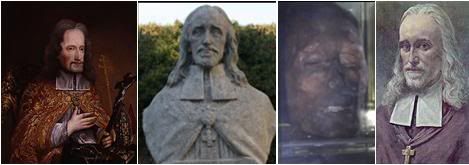 Panel shows the saint's head enshrined in Drogheda, Ireland.
ST. OLIVER PLUNKETT (Ireland, 1629-1681), Bishop, Primate of Ireland, Martyr
Panel shows the saint's head enshrined in Drogheda, Ireland.
ST. OLIVER PLUNKETT (Ireland, 1629-1681), Bishop, Primate of Ireland, Martyr
Mentioned early by Benedict XVI in his Letter to the Catholics of Ireland last March, Plunkett was martyred
by the English for defending the faith in Ireland during a period of severe persecution. He studied for the
priesthood and was ordained in Rome, where he served among the poor until he was appointed Archbishop
of Armagh. A new wave of anti-Catholic persecutions in 1973 forced him to do his pastoral work in secret
and to live in hiding. Priests were exiled, schools were closed, Mass had to be held in secret, convents
and seminaries were suppressed. In 1679, he was arrested and imprisoned in Dublin Castle, then sent
to London for trial. He was found guilty of fomenting revolt by a jury that deliberated for all of 15 minutes.
Then he was hanged, drawn and quartered. Considered the second patron of Ireland after St. Patrick, his
head is enshrined in Drogheda, his body in another abbey, and other relics in various Irish churches.
He was beatified by Benedict XV in 1920 and canonized by Paul VI in 1965.
Readings for today's Mass:
www.usccb.org/nab/readings/070210.shtml
No papal stories on Page 1 of today's OR. The only papal story is about the decrees on
various causes for sainthood signed by the Holy Father yesterday. Page 1 international news:
US Congress passes sweeping financial reform bill; Turkey and Israel in conciliation talks,
and Israel's Netanyahu invites the PLO's Abu Mazen to Jerusalem; Christian Wulff, a partymate
of Chancellor Merkel, is elected President of Germany.
THE POPE'S DAY
The Holy Father met today with
- H.E. Habbeb Mohammed Hadi Ali Al-Sadr, Ambassador from Iraq, who presented his credentials.
Address in English.
- Cardinal Giovanni Battista Re, emeritus Prefect of the Congregation for Bishops
- Mons. Vincent Gerard Nichols, Archbishop of Westminster (England) and president of the Bishops'
Conference of England and Wales;
- Cardinal Keith Michael Patrick O’Brien, Archbishop of Saint Andrews and Edinburgh, and president of
the Scottish bishops' conference; and
- Cardinal Cormac Murphy-O’Connor, emeritus Archbishop of Westminster
- Cardinal Antonio María Rouco Varela, Archbishop of Madrid, with a delegation of sponsors for World
Youth Day 2011 to be held in Madrid. Address in Spanish.
THE POPE'S SUMMER
The Pontifical Household announced today that the Holy Father will be transferring for the summer to
the Apostolic Palace in Castel Gandolfo on Wednesday, July 7, after the General Audience.
Private and special audiences will be suspended for the summer, and there will be no General Audiences
on July 14, 21 and 28. The GA will resume on August 2.
During this time, the Pope will lead the noontime Angelus from Castel Gandolfo on Sundays and religious
holidays.
NB: Before he goes on what would normally be his two-week summer vacation, the Holy Father will be
making a pastoral visit to Sulmona on Sunday, July 4.
[Modificato da TERESA BENEDETTA 02/07/2011 20:30] |
| |
 02/07/2010 16:15 02/07/2010 16:15 |
|
| | | OFFLINE | | Post: 20.504
Post: 3.142 | Registrato il: 28/08/2005
Registrato il: 20/01/2009 | Administratore | Utente Master | |
|
 Brace yourself. It should come as no surprise that a second BIG BAD WOLF, the BBC (Big Bad Canardmonger), appears to be sharpening its fangs anew and preparing to aim at Benedict's jugular once again ...
Pope Benedict XVI about to be
Brace yourself. It should come as no surprise that a second BIG BAD WOLF, the BBC (Big Bad Canardmonger), appears to be sharpening its fangs anew and preparing to aim at Benedict's jugular once again ...
Pope Benedict XVI about to be
'put on trial' by the BBC
by Tim Walker

02 Jul 2010
The BBC is planning a 90-minute drama which will take as its premise what would happen if the Pope were to go on trial for covering up sex abuse perpetrated by priests.
Mark Thompson, the BBC director-general, may be a devout Catholic, but the corporation is doing little to make Pope Benedict XVI feel welcome ahead of his first state visit to England and Scotland in September.
Mandrake can disclose that the BBC is planning a 90-minute drama which will take as its premise what would happen if the Pope were to go on trial for covering up sex abuse perpetrated by priests.
A BBC spokesman denied any knowledge of the project, but Paul Gilbert, who works in the corporation's drama department, admitted to me that he had for the past two weeks been involved with the "development" of a project with the working title of The Pope on Trial.
He said it was "too early" to talk about casting or on what channel it was envisaged the drama would be broadcast. [Oh, they will come up with some 'bombshell' designed to spoil the Pope's visit in the most clamorous - and maliciously false - way possible! At the very least, they can always rerun their 2006 defamatory documentary!... Oh, yes, they must be hoping that this 'Trial' play will be just as successful black propaganda as The Deputy was against Pius XII.]
The Pope, who has pledged to rid his church of "filth", has already been subjected to an investigation by the Radio 4 programme The Report into allegations that he covered up abuse.
The Most Rev Vincent Nichols, the leader of the Catholic Church in England and Wales, believes sections of the BBC are pursuing an anti-Catholic agenda. He had earlier been irked when the BBC had attempted to broadcast Popetown, a cartoon which mocked Pope John Paul II.
The Tablet, the Catholic newspaper, today expresses concern [Concern???? By the Tablet???] about how "hostile" British television in general is towards the Pope. Peter Tatchell, who is organising protests during the papal visit, has lately been commissioned by Channel 4 to make a programme about the Papacy.
When Thompson met with Vatican officials in Rome earlier this year, he reportedly lobbied for the Pope to contribute to Thought for the Day on Today on Radio 4. The idea did not, however, appeal to the Pope.
 BTW, conspicuous on the Pope's agenda today was a meeting with the top bishops of England and Scotland. Obviously, they discussed the coming visit and problems connected with it. But I said a silent prayer to the saints of England, Wales and Scotland, to intercede so that something can and will be done to restore Cardinal Newman's beatification Mass to the participation scale it deserves! Please God.....
BTW, conspicuous on the Pope's agenda today was a meeting with the top bishops of England and Scotland. Obviously, they discussed the coming visit and problems connected with it. But I said a silent prayer to the saints of England, Wales and Scotland, to intercede so that something can and will be done to restore Cardinal Newman's beatification Mass to the participation scale it deserves! Please God.....
[Modificato da TERESA BENEDETTA 02/07/2010 16:33] |
| |
 02/07/2010 17:19 02/07/2010 17:19 |
|
| | | OFFLINE | | Post: 20.505
Post: 3.143 | Registrato il: 28/08/2005
Registrato il: 20/01/2009 | Administratore | Utente Master | |
|
 John Allen serves up a convenient summary, as he usually does, even if his title is characteristically hyperbolic! The events were certainly newsworthy, even momentous, but they are also apples and oranges - they fall into widely divergent categories. And they certainly cannot be said to have shaken the Vatican - Benedict XVI, least of all - which, IMHO, whatever the facile short-term judgment, was not all really 'shaken' by the 350-degree massive assault it got over the sex abuse stories! It has seen the worst and Peter remains serene, undaunted and right! NON PRAEVALEBUNT!
Seven days that shook the Vatican
John Allen serves up a convenient summary, as he usually does, even if his title is characteristically hyperbolic! The events were certainly newsworthy, even momentous, but they are also apples and oranges - they fall into widely divergent categories. And they certainly cannot be said to have shaken the Vatican - Benedict XVI, least of all - which, IMHO, whatever the facile short-term judgment, was not all really 'shaken' by the 350-degree massive assault it got over the sex abuse stories! It has seen the worst and Peter remains serene, undaunted and right! NON PRAEVALEBUNT!
Seven days that shook the Vatican

July 2, 2010
It’s customary for the Vatican to empty its pipeline of pending business before the Pope heads for his annual summer retreat in Castel Gandolfo, which Benedict will do after his general audience next Wednesday. In itself, that usually makes for a flurry of news in late June, which was turbo-charged this year by dramatic events breaking in on the Vatican from the outside.
Consider the torrent of big-ticket Vatican stories during the past week:
•A spectacular series of police raids against the Catholic church in Belgium as part of a sex abuse probe, including drilling into the tombs of deceased archbishops in search of hidden documents, which set off a barbed diplomatic war of words between Brussels and Rome.
•An almost surreal kiss-and-make-up session [Who says it was kiss-and-make-up at all? It was school-bully-dressed down-down-by-the-principal, more like!] summoned between two cardinals, Christoph Schönborn of Vienna, Austria, and Angelo Sodano, dean of the College of Cardinals and the former Secretary of State under Pope John Paul II. The meeting came after Schönborn had accused Sodano in April of blocking action on an especially explosive Austrian chapter of the sex abuse crisis.
•A decision by the Supreme Court in the United States to allow a sex abuse lawsuit against the Vatican in Oregon to proceed, and the filing of a new lawsuit against the Vatican (as well as the Salesian order) in Los Angeles just two days later.
•Important personnel moves in the Vatican, including the appointments of Cardinal Marc Ouellet of Quebec to head the ultra-powerful Congregation for Bishops, and Bishop Kurt Koch of Basel, Switzerland, to replace Cardinal Walter Kasper as the Vatican’s top ecumenical official. In general, the appointments signal the triumph of theologians over diplomats in the Vatican, ensuring that men who share Benedict XVI’s spiritual and theological outlook are now firmly in charge.
•The creation of a brand-new Vatican department, the “Pontifical Council for the New Evangelization,” whose mission is to try to reawaken the faith in the West, above all in Europe, with Italian Archbishop Rino Fisichella named as the council’s first president.
•Struggles to contain the fallout from a financial scandal swirling around the Congregation for the Evangelization of Peoples, formerly known as “Propaganda Fidei,” with the Vatican first admitting “errors of judgment” and then twenty-four hours later insisting that wasn’t supposed to be taken as a reference to Sepe personally.
•A hearing of the European Court of Human Rights to determine whether the display of crucifixes in Italian public school classrooms violates European protections of human rights and freedom of conscience.
I’m in Rome, and I filed stories on most of those developments (and more, including interviews with the three American archbishops who received the pallium, the symbol of their office, on June 29), which can be found on the NCR web site.
We’re still waiting for one more shoe to drop, which is that the Congregation for the Doctrine of the Faith is expected to issue a set of revisions to the 2001 motu proprio governing sex abuse cases, Sacramentorum sanctitatis tutela, some time in the near future.
Faced with such a deluge of news, the obvious temptation is to miss the forest for the trees. Here, I’d like to step back from the details and ponder the question, “What does it all mean?” There are, of course, many possible answers, including the Homer Simpson version of Occam’s razor: “Why does it have to mean anything? Maybe it’s just a bunch of stuff that happened.”
Yet I’m inclined to think the past week does mean something, and here’s my first-blush stab at expressing it: Collectively, I think these events both symbolize and advance the collapse of Catholicism as a culture-shaping majority in the West.
When the dust settles, policy-makers in the church, particularly in the Vatican, will be ever more committed to what social theorists call “identity politics,” a traditional defense mechanism relied upon by minorities when facing what they perceive as a hostile cultural majority.
While there are an almost infinite number of ways of defining a “minority,” one widely invoked model says it has four characteristics:
•Suffering discrimination and subordination
•Physical and/or cultural traits that set them apart, and which are disapproved by the dominant group
•A shared sense of collective identity and common burdens
•Socially shared rules about who belongs and who does not
A growing swath of Catholics in the West, particularly in the church’s leadership class, believes that all these markers now apply to the Catholic church, and the events of the past week will strongly reinforce those impressions.
Taken together, the police raids in Belgium, the refusal by the Supreme Court in the United States to block a sex abuse lawsuit against the Vatican, and the European Court of Human Rights challenge to display of Catholic symbols in Italy all suggest that the final pillars of deference by civil authorities to the Catholic church are crumbling.
That’s a long-term historical process accelerated by the sexual abuse crisis, as well as by other scandals and PR meltdowns (such as the financial controversy currently surrounding Propaganda Fidei and its former prefect, Naples Cardinal Crescenzio Sepe.)
Even if Italy prevails in the crucifix case, it will not be on the basis of some privileged legal status for Catholicism, but because of nationalist resentments in many European nations over perceived EU hegemony.
Likewise, if the Vatican succeeds in getting the sex abuse lawsuits dismissed in the States, it won’t be because American courts regard the Catholic church as “untouchable” but because of technical arguments about the implications of national sovereignty. [Who wants a judgment that is not based merely on obsolescent cultural sentiment, anyway??? Any judgment granted should be on solid legal ground, nothing more.]
Of course, some observers -- and not just religion’s cultured despisers, but many Catholics themselves -- welcome all this, seeing it as a long-overdue dose of humility and accountability.
On the other hand, a growing band of Catholic opinion, certainly reflected in the Vatican, believes that a “tipping point” has been reached in the West, in which secular neutrality toward the Church, especially in Europe, has shaded off into hostility and, sometimes, outright persecution. [Cardinal Ratzinger saw that tipping point already in the 1980s, which is one of the reasons THE RATZINGER REPORT drew such controversy!]
Some blame a rising tide of neo-paganism in the West for the Church’s woes, while others say Church leaders, and especially the Vatican, have no one to blame but themselves. Whichever view one adopts, the empirical result is the same: Catholicism no longer calls the cultural tune. [Excuse me - but when was the last time that it did??? Before the French Revolution maybe? Since then, it has had to compete with prevailing 'enlightened' culture.]
Benedict’s decision to launch an entire department in the Vatican dedicated to treating the West as “mission territory” amounts to a clear acknowledgment of the point.
Facing that reality, Catholicism, both at the leadership level and in important circles at the grass roots, is reacting as social theorists would likely predict, with a strategy that other embattled minority groups -- from the Amish to Orthodox Judaism, from the Gay Pride movement to the Nation of Islam -- have often employed: Emphasizing its unique markers of identity, in order to defend itself against assimilation to the majority.
Benedict’s curial appointments this week move in that direction.
All three new Vatican heavyweights -- Ouellet, Koch, and Fisichella -- share Benedict’s commitment to a “hermeneutic of continuity” in reading the Second Vatican Council (1962-65), stressing that it did not repeal earlier layers of Catholic teaching and tradition. All three are committed to recovering a “thick” sense of Catholic identity, encoded in traditional markers of Catholic thought, speech and practice -- Mass in Latin, or in vernacular translations closer to Latin; an ecclesiology which emphasizes the unique status of the Catholic church vis-à-vis other Christian denominations and other religions; and in general, a strong sense of Catholic distinctiveness.
Strikingly, neither the Secretariat of State nor the Congregation for Bishops, traditionally considered two of the three most powerful offices in the Vatican (alongside the Congregation for the Doctrine of the Faith), are now led by men who come out of the Vatican’s diplomatic corps. Instead, management has been entrusted to theological protégés of the Pope, who accent the church’s spiritual and doctrinal identity rather than Realpolitik.
Critics sometimes regard all this as a “rolling back of the clock,” meaning nostalgia for the church before the reforms of Vatican II. Seen through a sociological lens, however, it looks more like Catholicism adjusting to its post-modern minority status -- you can debate the cure, but the diagnosis, at least, seems solidly in touch with reality.
To be sure, Benedict XVI’s ambition is not merely that the Church in the West will be a minority, but a “creative minority,” a term he borrows from Arnold Toynbee. [All this he expressed clearly in the 1984 Ratzinger Report, which spurred John Paul II to call a special Bishops' Synod in 1985 to examine and critique the 'reception' of Vatican II, ie, the Churcc in the modern world, by the Church itself - out of which came the idea for a contemporary edition of the Catechism of the Catholic Church precisely as a convenient reference that defines all the elements of Church Magisterium. The new dicastery appears to be a fairly recent project for Benedict XVI, even though something similar had been attempted right after Vatican II - because the Vatican does not yet have the details for its structure, specific agenda and procedures.]
The idea is that when great civilizations enter a crisis, they either decay or are renewed from within by “creative minorities” who offer a compelling vision of the future.
The $64,000 question, therefore, is whether Benedict’s version of a “politics of identity” is the right way to unleash the creativity in Catholicism that will allow it to play a transformative role in the cultural movements of the future. One thing’s for sure: projecting a robust sense of Catholic identity seems poised to be the guiding principle in Rome for some time to come.
All well and good. But Benedict XVI's principal guideline is not the sociologists' self-evident prescription to 'project a robust sense of Catholic identity' but something more essential: to teach every Catholic first - from the ordinary Joe and Mary to the most erudite cardinal - what it means to be Christian and Catholic. You cannot project an identity without first knowing what that identity consists of, and most of all, what it demands. That is why the Church's mission has remained unchanged since the time of Jesus: to announce his Word and live it!
[Modificato da TERESA BENEDETTA 02/07/2010 17:24] |
| |
 02/07/2010 18:51 02/07/2010 18:51 |
|
| | | OFFLINE | | Post: 42
Post: 42 | Registrato il: 19/03/2010
Registrato il: 19/03/2010 | Utente Comunità | Utente Junior | |
|
by Michael Sean Winters on Jul. 02, 2010
This morning’s New York Times “expose” regarding then-Cardinal Ratzinger’s role in the Vatican’s response to the clergy sex abuse crisis exposes more than it intended. It exposes the fact that the authors, Laurie Goodstein and David Halbfinger, and their editors, do not understand what they are talking about and, at times, put forward such an unrelentingly tendentious report, it is difficult to attribute it to anything less than animus.
The article put me in mind of Lady Bracknell in Oscar Wilde’s The Importance of Being Earnest. “To lose one parent, Mr Worthing, may be regarded as a misfortune; to lose both looks like carelessness.” One or two mistakes are to be expected. The friend I consult on environmental matters tells me that when she reads the Times on the subject, she assumes they will get it wrong. But a slew of such mistakes raises doubts. Ignorance is a scarcely less heinous crime for a reporter than bias. You be the judge.
The Times writes: “More than any top Vatican official other than John Paul, it was Cardinal Ratzinger who might have taken decisive action in the 1990s to prevent the scandal from metastasizing in country after country, growing to such proportions that it now threatens to consume his own papacy.” First, by the 1990s, much of the abuse had already occurred, as the article later notes. The Porter case in Fall River, Massachusetts, the Gauthe case in Layafette, Louisiana, the Geoghan case in Boston, all involved sex abuse that had already taken place. It was the fallout from those cases that remained to be dealt with. The “metastasizing” had already happened, and the reasons for that are complicated and various. They are not solely attributable to the culture of the Vatican curia.
More importantly, as the Times articles notes, it was Pope John Paul II who was dismissive of such charges, having seen the communist authorities in Poland use similar accusations to besmirch the reputation of the Church. Pope John Paul II was wrong not to take the charges more seriously. And, the Vatican’s structures and culture do not allow anyone, even a powerful cardinal, to initiate a policy in the face of papal opposition. Those structures and that culture undoubtedly kept the Vatican from responding quickly and decently to the crisis. But, it is foolishness to think that Ratzinger could have swept it all away with a few forceful interventions. Indeed, according to the Times, at the “secret” meeting at the Vatican to discuss the issue Ratzinger did forcefully argue for swifter procedures and penalties. Which is it? Was he dragging his feet or was he advocating for a more forceful response?
It is clear that the Times reporters do not understand the first thing, or at least the second thing, about the Church’s understanding of ordination. They write: “Dismissing a priest is not like disbarring a lawyer or stripping a doctor of his medical license. In Catholic theology, ordaining a priest creates an indelible mark; to return him to the lay state required the approval of the pope.” This is half true. The priesthood is not like being a lawyer and there is an indelible mark left by ordination. In the 1970s and 1980s, many priests were seeking laicization, and Pope John Paul II understandably worried that this phenomenon was casting doubt on the fact that the priesthood is forever. Indeed, even a priest who has been defrocked can, in extremis, hear a confession or say Mass. To return someone to the “lay state” is to dispense them from the vow of celibacy. There is no way to dispense someone from ordination. Why? Because the actor in a sacrament such as ordination is not the bishop or the Pope, it is God, and you can’t just un-do that. We had this debate with the Donatists in the 4th century but I am not sure the editors of the Times would know a Donatist from a doughnut.
The Times article comments, this is not reporting really, that, “Yet throughout the ’80s and ’90s, bishops who sought to penalize and dismiss abusive priests were daunted by a bewildering bureaucratic and canonical legal process, with contradicting laws and overlapping jurisdictions in Rome, according to church documents and interviews with bishops and canon lawyers.” Have Ms. Goodstein and Mr. Halbfinger ever seen a rerun of “Law & Order”? Legal processes are complicated and sometimes bewildering. The authors note that some cardinals were worried about maintaining the presumption of innocence in ecclesiastical tribunals. The horror. Shame on them. Worrying about a silly thing like the presumption of innocence in a court of law. Hell, it is only one of the cardinal (no pun intended) principles of a civilized society.
But, the sentence that most betrays the bias of the Times has nothing to do with the sex abuse of minors. In making the case that Cardinal Ratzinger found time to pursue other matters of lesser importance, they write: “As Father Gauthé was being prosecuted in Louisiana, Cardinal Ratzinger was publicly disciplining priests in Brazil and Peru for preaching that the church should work to empower the poor and oppressed, which the cardinal saw as a Marxist-inspired distortion of church doctrine.” This reads as “Bad Cardinal Ratzinger, persecuting those justice-loving liberation theologians.” The operative word in that sentence is “for.” Cardinal Ratzinger did not, in fact, punish liberation theologians “for preaching that the church should work to empower the poor and oppressed.” He took steps against Liberation Theology because it was built on a faulty anthropology, entailed a materialist analysis of the human person, and reduced the idea of the “Kingdom of God” to a more just earthly regime. The Church believes that the true liberation wrought by Jesus Christ on the Cross will yield a justice that does not have to be fought for generation after generation, and Ratzinger argued that Liberation Theology missed that fact. He may have been right, he may have been wrong. (I think he was right.) But, the way the Times describes his actions meets any standard definition of tendentiousness.
As for the import of the 1922 and 1962 documents, about which the story makes so much, the Times acknowledges that there was confusion about who did and did not have authority to deal with the crime of sex abuse until 2001. That confusion reigns still. This morning I consulted two highly respected canon lawyers. One said that the documents did give the CDF authority in the disputes. The other said the documents only gave CDF authority over the crime of solicitation in the confessional. Again, check in with Jack McCoy.
I do give credit to the Times article for noting the strides that have been made since 2001, and especially by the U.S. Bishops, in confronting the sex abuse crisis. It is becoming increasingly clear that Archbishop Wilton Gregory, who was the president of the USCCB at the time, is a hero. And the Times even recognizes at points that Ratzinger was on the side of the angels in the internal debates within the curia. But, then, why the persistent witch hunt?
Am I suffering from siege mentality? I do not think so. I hope not. But, reading and re-reading the Times’ article, noting its length and the definitive, dare we say it, infallible tone of the article, it is hard not to conclude that the authors went in with an agenda, and gussied up the “evidence” to make the point they desired to make. That is not reporting. Goodstein and Halbfinger’s writings might warrant a spot on the opinion pages of the Times, but they are misplaced in the news section.
ncronline.org/blogs/distinctly-catholic/contra-nytimes |
| |
|
|
|
|